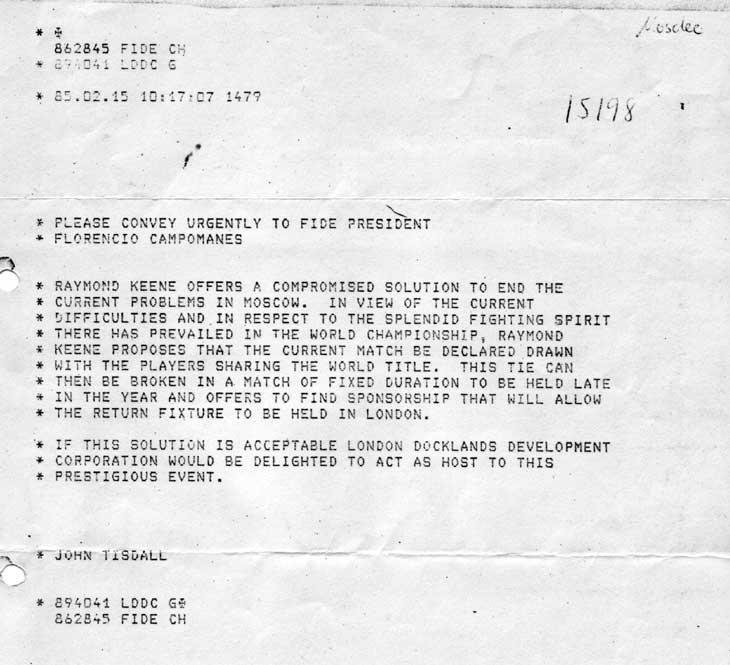
Edward Winter
In his review of Kasparov’s Child of Change in the 8/1987 New in Chess, Tim Krabbé questioned whether Kasparov was wronged by the termination of his first match since he was trailing 3-5 against Karpov. This reasoning, originally voiced by hardly anyone except the American writer Hugh Myers, is now gaining ground. Two other critics of Kasparov’s latest autobiography who have echoed Krabbé’s doubts are Leonard Barden and Nigel Short. The former wrote on page xviii of the Financial Times of 21 November 1987:
‘Central to Kasparov’s thesis is the “day of shame” when Campomanes abandoned the 1984-85 world title match just after the youthful hero had recovered from 1-5 down to 3-5. Karpov still needed only one win to complete the six required for the match. Kasparov’s account of this episode repeats his earlier public statements and seems to have it both ways. In one paragraph he says, “I wanted no part in any deals behind closed doors”. In the next, “the FIDE proposal to stop now and start afresh ... wasn’t so bad for me ... to start play again at nil-nil was better than 5-3 against”. It is a strange plot which, by its victim’s own assessment, doubled his chances of victory.’
Under the title ‘Grandmaster of Self-Delusion’, Short asked on page 43 of The Spectator of 17 October 1987:
‘... what sort of conspiracy gives Kasparov a chance to start afresh the match, at 0-0, when he is 5-3 down against one of the greatest chess geniuses ever? Whereas, if the match was continued his chances of winning were, by his own admission, a mere 25-30%.’
There seems to be a distinct move away from how the termination decision was interpreted at the time; in 1985 it was widely condemned as Campomanes’s response to panic-stricken pleas that he save the title of his worn-out friend Karpov. That was the message in Kasparov’s fulminations against Campomanes, Karpov, Sevastyanov, Gligorić, Kinzel, etc. in a series of press conferences and interviews. Journalists believed him and were unreceptive to other points of view.
Now, some three years after ‘The Day of Shame’, as Kasparov terms it, Child of Change provides an opportunity to analyse the affair more soberly. In investigating the reliability of the claims made by Kasparov and his supporters, we may reduce the issues to five basic questions.
1) Was Karpov exhausted towards the end of the match?
Karpov has always strongly denied it, so let us examine what Kasparov has said. On page 125 of Child of Change he claims that Karpov ‘had exhausted his strength’ and says on page 130 that ‘the blunt reason they called a halt was because Karpov was in no state to go on without the serious risk of defeat’. Unfortunately, on pages 124-125 he contradicts himself:
‘Some people – Karpov’s supporters, of course – have claimed that the quality of the chess at the end was very poor, showing that the champion must have been sick and that my victories were a fluke. This is not borne out by close analysis. Grandmasters have picked out the following games for “outstanding technical expertise, brilliant ideas or sheer sporting excitement”: numbers six, nine, twenty-seven, thirty-two, thirty-six and crucially – game forty-eight, the very last one. [In fact this anonymous quote is not by ‘grandmasters’ but by Raymond Keene, taken from page 140 of The Moscow Challenge.] The people around Karpov couldn’t understand what was happening. Because he had beaten me so easily in the early games, they assumed he must be unwell to be losing at the end. But Karpov himself knew better. He knew that in the last game, a good game of chess, I caught him out in one mistake. His people couldn’t see this. To them if Karpov is losing he must be sick, so we must protect him – and, incidentally, of course, ourselves.’
Kasparov reiterates this on page 143:
‘The people around him attributed my late victories to the fact that he was so exhausted, but Karpov knew better. He knew it was my chess that was beating him.’
2) Was Kasparov in good physical and mental shape at the end of the match?
Here is a quote from page 130 of Child of Change, referring to game 48:
‘Of course, it was very embarrassing for them that I won this game – and even more embarrassing that I won it with such good play. For this invalidated their argument that both of us were too exhausted to play good chess. As John Nunn has pointed out, forty-eight games is not at all an unusual number for grandmasters to play over a period of five months, and a number of the forty draws played in Moscow were short. I was certainly feeling in better shape than I had in September, as I kept pointing out to every official I came across.’
However, let us compare that with what Kasparov said in an interview in the 7/1985 New in Chess (page 7):
‘Exhaustion did exist anyway ... The most difficult to cope with was the psychological exhaustion, which increased even when a game was not so intense, because the match lasted a long time, and the responsibility was great. Regardless of whether a game was short or long, and even when one did not find oneself in extremely taxing circumstances, one could not relax, and had to think about the match all the time. One’s brain was working, and the nervous tension did not stop, not even for a moment.’
3) In what circumstances did Campomanes return to Moscow shortly before terminating the match?
In studying this question, Kasparov’s words on page 125 of his book should be borne in mind: ‘The final truth about this match, I believe, is as Grandmaster Keene reported it.’ Kasparov and Keene are close friends who have collaborated on literary and political projects; Keene’s writings are frequently quoted with approval in Child of Change.
Now, this is what Raymond Keene wrote on page 8 of The Spectator of 23 February 1985:
‘On the evening of Saturday 9th February, Campomanes was telephoned urgently from Moscow, with the stunning message from the world champion’s camp that Karpov, having lost two games in a row, was unable to continue and Campomanes should fly at once to Moscow to bail him out.’
It should, however, be noted that:
Raymond Keene himself (see May 1986 BCM, page 206) no longer defends his quoted words from The Spectator; nor has he retracted them.
Finally on this episode, one may note what Donald Schultz of the United States Chess Federation said on page 34 of the January 1988 Chess Life:
‘The recent campaign [Keene/Lucena v Campomanes] was one of the dirtiest I’ve ever seen. It was based on unproven innuendo. For example, the phone call that Campo received during the first Karpov-Kasparov match. They stated that it was from Karpov and that Campo was supposed to go to Moscow. I was there, in the room, when Campo received the call; it was from Svetozar Gligorić, and it asked that Campo go to Lucerne, to meet with Alfred Kinzel.’
4) Was Kasparov disadvantaged by the termination decision?
Firstly here, we may recall what Barden quoted: Kasparov’s words on page 133 of Child of Change about a new match starting at 0-0:
‘In a way this wasn’t so bad for me. I was sure I would win the second match. I had become much wiser than at the beginning of this one. And to start playing again at nil-nil was better than five-three against.’
Reviewing the book on page 37 of the Sunday Telegraph of 18 October 1987, Raymond Keene wrote:
‘Kasparov claims that Campomanes halted the first Kasparov-Karpov match “without result” just as the former was on the verge of victory.’
In fact, Kasparov stated (see page 141 of Child of Change) that his chances of winning the match were ‘about 25 or 30%’. It is not clear how Keene interprets 25 or 30% chances as meaning ‘on the verge of victory’.
[As noted below, in the 4/1988 New in Chess Raymond Keene replied to our accusation of misrepresentation on this matter by simply writing, ‘I have a right to my own opinion’. That naturally disregards the fact that in the Sunday Telegraph he had been professing to report Kasparov’s claim – non-existent in reality – of being on the verge of victory. In any case, is it even Keene’s opinion? On page 51 of his 1990 book How to Beat Gary Kasparov he wrote that ‘at the end his [Kasparov’s] chances may have been superior’ (emphasis added).]
5) Was the termination decision defensible as a matter of principle?
Firstly, it should be recalled that nobody appears to have suggested outright termination of the match until Kasparov himself did so to Kinzel at the very beginning of February 1985. (Kasparov and Kinzel subsequently gave conflicting accounts of the circumstances and context in which Kasparov proposed that the match should be terminated.)
Kasparov nonetheless writes on page 155 of Child of Change:
‘... as Ray Keene pointed out when Campomanes visited London: “He proceeds from the arguable premise that a ‘decision’ was needed at all. In fact, no decision was necessary, since the match was proceeding according to regulations and these should have been allowed to run their course”. Precisely.’
The principle that ‘no decision was necessary’, which Raymond Keene expounded on page 42 of The Spectator of 4 May 1985 and repeated on page 20 of Manoeuvres in Moscow, is further illustrated by his words on page 204 of the May 1986 BCM:
‘... a vast amount of the criticism aroused by the K-K match termination is not because that termination damaged the specific rights or chances of either player. Rather it is because outside intervention from a third party violates the very nature of chess.’
(One notes in passing that the argument that Karpov had to be ‘bailed out’ has been dropped.)
However, on page 21 of Manoeuvres in Moscow Keene wrote:
‘Ironically, had Campomanes kept silent after game 48 and only stepped in to stop the match if there had been a further series of draws, his action would probably have met with widespread approval.’
So the argument now is that what was wrong was Campomanes’s timing, not the principle of termination (or ‘outside intervention from a third party’).
Raymond Keene’s protests about Campomanes’s decision need to be viewed in the context of the following telex, which was sent on 15 February 1985 from London to Lucerne and Moscow:
‘Please convey urgently to FIDE President Florencio Campomanes
Raymond Keene offers a compromised [sic] solution to end the current problems in Moscow. In view of the current difficulties and in respect to the splendid fighting spirit there has prevailed in the world championship, Raymond Keene proposes that the current match be declared drawn with the players sharing the world title. This tie can then be broken in a match of fixed duration to be held late in the year and offers [sic] to find sponsorship that will allow the return fixture to be held in London.
If this solution is acceptable London Docklands Development Corporation would be delighted to act as host to this prestigious event.
John Tisdall.’

Raymond Keene has provided two contradictory claims as to when the telex was despatched. On page 139 of The Moscow Challenge he indicated that it was sent after the final announcement by Campomanes that Karpov ‘accepted’ the termination decision and Kasparov ‘would abide by it’. However, on page 411 of the September 1986 BCM he stated that the telex was sent in the morning, in reaction to an (inaccurate) announcement on the radio that the match had already been terminated.
Conclusion:
It is only considerations of space that prevent further contradictions and inconsistencies from being given here. Let’s finish with one final puzzle, a brief quote from page 135 of Child of Change, where Kasparov describes the scene in Moscow immediately after – yes, after – Campomanes’s press conference announcement that the match was being terminated, with a new one to start at 0-0 the following September:
‘There was a great deal of shuffling and noise in the audience at this news. The video tape shows my trainers and myself talking and laughing among ourselves.’
The obvious question here is: why were Kasparov and his trainers laughing?
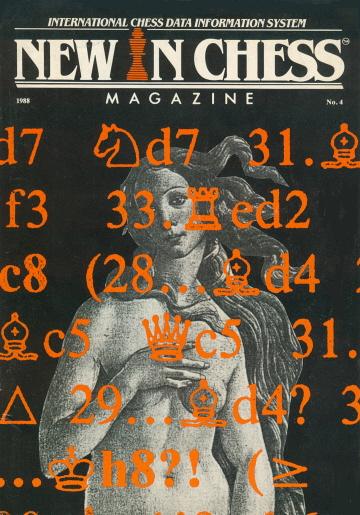
The above article was published on pages 53-56 of the 2/1988 New
in Chess. In the correspondence section of the 4/1988 issue
Raymond Keene submitted a long response (on pages 4-6) which we
are not entitled to reproduce here but which should on no account
be missed or forgotten. He was on notably duplicitous form, but
fell flat on his faces.
Below is the reply contributed by us in the same issue of New in Chess (pages 6-8):
By providing exact page numbers for all quotes, my article permitted readers to make an independent check of the source material, and my only difficulty lay in selecting a small sample of inconsistencies and contradictions from the available heap. I pointed out many others in a very detailed (2,500 words) review of Child of Change in the September-October 1987 issue of Chess Notes, and nobody has disputed a single one of them.
1. Campomanes’s return to Moscow
By means of a lengthy but largely irrelevant account of a conversation with Campomanes, Mr Keene skates over my list of five observations on his Spectator column. He still fails, for instance, to corroborate or withdraw his claim that the telephone message was ‘from Karpov’s camp’ or that Campomanes was told he ‘should fly at once to Moscow to bail him out’. That frenzied version of events has been contradicted by all parties, and the fact that Gligorić made the telephone call is now accepted even by Kasparov (see page 131 of Child of Change).
Mr Keene summarily rejects the testimony of Donald Schultz (who, unlike him, was present in Dubai during the telephone call) on the grounds that he has ‘found him on the key issues to be a faithful adherent to the FIDE line’. Such logic can easily be turned against Mr Keene: his virulent anti-FIDE stance automatically means that he is an unreliable witness on all matters concerning Campomanes. Indeed, his eagerness to ridicule the FIDE President has involved him over the years in many errors, such as his over-hasty conclusion that Kasparov was forced to take a time-out on 11 February 1985, whereas Kasparov himself has stated (Child of Change, page 131) that it was his own free decision.
2. The Principle of Termination
Nobody who reads page 21 of Manoeuvres in Moscow will take seriously Mr Keene’s explanation of his remark about ‘had Campomanes kept silent ...’ There is no indication whatsoever in the text that he disagreed with the view that subsequent termination of the match would have merited ‘widespread approval’.
His convoluted defence of the telex fails to deal with the clear-cut contradiction pointed out by my article (page 56): in the BCM he stated clearly that the telex was sent before the press conference started, but in The Moscow Challenge he stated equally clearly that it was sent after the press conference ended (which means more than 90 minutes (!) after Campomanes first took the floor). If that is not a contradiction then the word has no meaning.
His letter contains further proof of his unreliability on matters of timing, for he suggests that the Tass report was anterior to the British radio announcement. Yet on page 411 of the September 1986 BCM the same Mr Keene stated the exact opposite, claiming that the Tass report came over an hour later. He also admitted there, contrary to the impression he gives above, that he himself did not actually hear the BBC’s (inaccurate) news report but was merely told about it by an unnamed third party.
There is no secret as to how I acquired Mr Keene’s embarrassing telex. Having noted by Autumn 1985 that published references to it were inconsistent, I wrote an enquiry to the FIDE Headquarters. Incidentally, upon receiving a photocopy I was able to note a further untrue remark by Mr Keene: on page 139 of The Moscow Challenge he stated that his termination proposal in the telex was made ‘in my capacity as president of the Commonwealth Chess Association’. In fact, the CCA was not mentioned anywhere in the message. With Mr Keene things are rarely straightforward.
His position would be consistent and comprehensible only if he had sent a telex to Campomanes arguing for the match to be continued. He did not do so.
3. Was Kasparov disadvantaged?
By referring to the ‘right to my own opinion’ Mr Keene indulges in an astounding piece of prevarication. This section of my article presented two incontrovertible facts: A) Kasparov stated that his winning chances were 25/30%, and B) in the Sunday Telegraph Mr Keene falsely wrote that Kasparov has claimed (in Child of Change) that he had been ‘on the verge of victory’. Mr Keene’s ‘right to my own opinion’ does not include the right to distort Kasparov’s position by putting that opinion into the world champion’s mouth.
4. Conclusion
Passing over his curious speculation about Kasparov’s laughter, we come to his even more curious (and gratuitous) final paragraph. Given his track record of inaccuracy (the telephone call episode is just one example) Mr Keene is a poor advertisement for the profession of roving reporter. Moreover, his suggestion that I should refrain from analysing the Termination as I was not present in Moscow at the time is breathtaking for the simple reason that he was not there either. Although both of us are without ‘first hand knowledge of the occurrences’, the difference between us is that Mr Keene rejects outright the testimony of virtually all personalities who were there (Campomanes, Karpov, Sevastyanov, Gligorić, Kinzel, etc.), just as his letter peremptorily dismisses Donald Schultz’s eye-witness report from Dubai.
The independent writer who sifts the available documentation without fear or favour has a considerable advantage over Mr Keene, who has far too many vested interests. On the Termination issue, as on many others, he has regularly misused his journalistic position with The Times, The Spectator and B.T. Batsford Ltd. in furtherance of his political campaign to oust Campomanes. His weapons have been the very kind of ‘twisting or turning’ and ‘selective quotation’ which he unjustifiably attributes to me. Readers of Chess Notes have seen countless (unrefuted) examples.
Mr Keene further distorts the truth by claiming I consider myself ‘a great expert’ on the Termination affair, whereas I have repeatedly stated in Chess Notes and elsewhere that I am a ‘Don’t Know’. I have never argued that the deficiencies of the Kasparov/Keene version automatically mean that Campomanes was right to stop the match. Unlike Mr Keene, I am convinced that much more research is required; the results of the subsequent Kasparov-Karpov matches are irrelevant to the issues of principle raised by Campomanes’s controversial decision.
Below is Annex A to the FIDE President’s Circular Letter number 3 (1985/6), an attestation from Don Schultz regarding the telephone call received by Campomanes in Dubai:
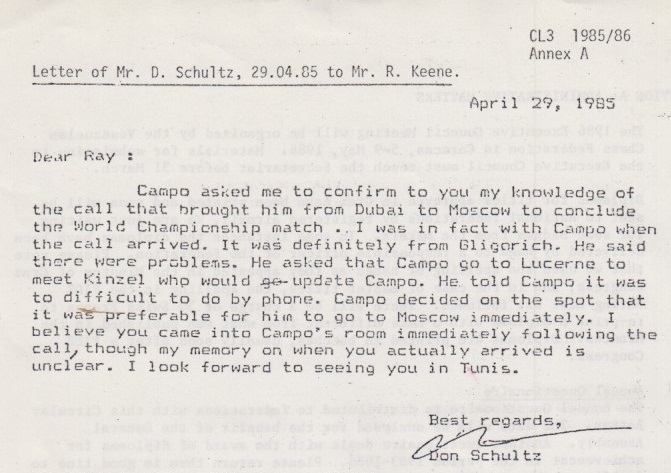
In the May 1985 Chess Life (page 22) David Goodman, Keene’s brother-in-law, reported the above-mentioned Spectator article: ‘Keene ... claimed that while Campomanes was visiting Dubai, the President received an emergency phone call emanating from Karpov’s camp in Moscow ...’ When it was pointed out by a Chess Life reader that Gligorić, and not the Karpov camp, had made the call, Goodman claimed (page 6 of the October 1985 Chess Life) that ‘the word “emanating” does not suggest who made the actual call but who instigated it’. As may be seen above, however, Keene had stated in The Spectator of 23 February 1985 that the call was from Karpov’s camp. The word ‘emanating’ was Goodman’s.
On page 34 of the February 1988 Chess Life, Keene reacted to an accusation that he had been inaccurate about the origin of the telephone call:
‘... the reader is asked to refer to the May 1985 CL (page 22). There, I am quoted as saying that “the President received an emergency phone call emanating [my italics – R.K.] from Karpov’s camp in Moscow” ...’
Thus instead of admitting that his Spectator account had been inaccurate, Keene quoted Goodman’s misreporting of it. He even emphasized Goodman’s word ‘emanating’, giving the false impression that it was the term he himself had used.
We pointed out this matter in C.N. 1568, with his conclusion:
Extraordinary. Mr Keene conceals from Chess Life readers his actual words and shelters behind his brother-in-law’s misquotation of them.
Our original New in Chess article was reproduced on pages 172-179 of Kings, Commoners and Knaves, together with a further example discussed by us on page 392 of the 8/1986 issue of the Swedish magazine Schacknytt:
Another startling case of serial invention by a journalist writing about the Termination of the 1984-85 Karpov v Kasparov match is given in the present item. Firstly, let us examine the message which the President of the USSR Chess Federation sent to Campomanes shortly before the match was terminated:
‘To the President of FIDE, Mr F. Campomanes
Taking into account the unprecedented duration of the world title match between A. Karpov and G. Kasparov, which is still in progress after more than five months, and in which 48 games have already been played (that is two full matches under the old rules), the USSR Chess Federation, expressing concern about the health of the participants, requests a three-month suspension of the match.
As is known, there was envisaged in the agreement of the unlimited match Fischer-Karpov (1976 – sic) a break after four months’ play. This provision was included on the basis of advice of medical specialists. Yet the Karpov-Kasparov match, as already pointed out, has exceeded this length and is still in progress.
We also point out that the proposal to have a break does not run contrary to the FIDE Constitution, nor to the match regulations, and, we feel, would be met with satisfaction by the public opinion of the chess world.
Your positive decision would be helpful and in the interests of the development of chess creativity.
Respectfully yours, V.I. Sevastyanov
13 February 1985.’
Now, compare that with how B.H. Wood summarized the letter in the February 1985 CHESS (page 283):
‘… Vitaly Sevastyanov, the ex-astronaut president of the Soviet Chess Federation, wrote Campomanes a letter on 14 February, again admitting that Anatoly could not go on and begging for a stop to the match, with Karpov retaining his title and Kasparov “permitted” a rematch later in the year.’
One may note that:
- Wood gives the incorrect date;
- The letter did not ‘admit that Anatoly could not go on’. It referred to both players;
- It did not ‘beg’ for the match to be stopped;
- There was nothing about Karpov retaining his title;
- There was nothing about a rematch for Kasparov;
- Sevastyanov was asking for a suspension of the match, which Campomanes refused to grant;
- Wood never corrected, or apologized for, his amazing litany of misinformation.
Annexe 10 to the FIDE President’s Circular Letter No. 4 1984/85 reproduced Sevestyanov’s communication of 13 February 1985 in Russian and English.
At the time of the Termination Affair the BCM (then owned by the British Chess Federation, of which Raymond Keene was an official) gave Keene a comfortable ride, and it was not until 1993 (page 228 of the May issue – an article by Murray Chandler and Bernard Cafferty) that an epiphany occurred [see below under the heading ‘Fleeting epiphany’], as the BCM belatedly (and euphemistically) referred to Keene’s practice of ‘reinterpreting history in The Times’. The following specifics were offered on that same page of the BCM:
‘Repeatedly attacking FIDE President Campomanes for halting the 1985 title match against Karpov “when Kasparov had won several games in a row”. Kasparov himself assessed his chances at only 30% at that point. The final score (5-3 to Karpov) was never mentioned, nor the fact that the re-match started with level scores.’
As noted on page 271 of Kings, Commoners and Knaves, Keene also wrote, in The Times of 27 February 1993, page 5, that ‘Kasparov revived and began to win game after game’, and there was more of the same on page 49 of Man v Machine by R. Keene and B. Jacobs with T. Buzan (Brighton, 1996); that book asserted that the 1984-85 match was stopped ‘just as Kasparov had started to win a series of games’.
When there is such a premeditated and deliberate plan to deceive about, even, the basic score of the match, what chance exists of sorting out the complexities of the Termination itself? Back in 1985 (in C.N. 1020) John Nunn wrote to us:
‘... I doubt whether the full truth will ever be revealed. ... I have given up trying to reconcile the many conflicting statements about the events in Moscow. My own view is that it isn’t necessary to evoke any conspiracy theories; muddleheadedness, lack of communication and incompetence are enough to explain the whole bizarre story.’
But should chess writers and researchers throw up their hands and admit defeat? Is there really no longer any chance of determining the truth? In whose interests would it be for matters to be left unresolved? Below is a follow-up item we wrote in June 2004 (C.N. 3328).
The 20th anniversary of one of the most controversial happenings in chess history will come on 15 February 2005: the Termination of the first world championship match between Karpov and Kasparov. In C.N. 1990 (see CHESS, November 1993, page 50) we called it a topic ‘which chess literature (books and articles) has yet to settle authoritatively’, and it may be wondered whether any fresh details have emerged since then. Investigative journalism being virtually non-existent in the chess world, there is every reason for truth-seekers to fear (and for others to hope) that the 20th anniversary will come and go without new, accurate information being brought to light or old, inaccurate information being laid to rest.
Kasparov, for his part, has stated (on page 127 of his book Child of Change) that ‘the full story may never be known’, although he has often set forth what he calls his ‘theories’. And what about Karpov? His book Karpov on Karpov (New York, 1991) had the subtitle ‘Memoirs of a chess world champion’, but the Termination Affair was (remarkably and, indeed, shockingly) ignored. Are none of those involved in the controversy willing and able to state now, plainly and factually, what they do and do not know, so that chess historians are offered at least a sporting chance of piecing together the truth?
Our own attempts date back to 1985-86. On 1 January 1986 the then General Secretary of FIDE (the late Lim Kok Ann of Singapore, who was, in our experience, a gentleman of great integrity) informed us:
‘Mr Campomanes agrees to give you a written interview, an exclusive, though he has answered sundry questions on the Termination. Mr Campomanes is prepared to face any question you care to ask.’
As reported in C.N. 1098 [i.e. the March-April 1986 issue of our magazine], the planned interview did not work out:
‘Our questions (26 in number) may certainly have amounted to quite a grilling, but they were, if we may say so, fair and objective questions that Campomanes will surely be obliged to answer sooner or later somewhere or other.’
At one point we did receive from FIDE a Dictaphone cassette and transcript, but Campomanes’s answers (to only four questions) were so discursive and disjointed that turning them into a printable item was beyond our ability. We hope that, even now, an enterprising writer will be able to pull off the feat of obtaining from Campomanes his ‘definitive’ version of the events in Moscow. More generally, it would be most welcome to see a reliable journalistic write-up of the entire Termination Affair which is devoid of speculation. The matter is simply too important to be touched by the ‘I-think-I-read-somewhere’ and ‘My-guess-would-be’ brigade.
Sorting out fact from fiction is a time-consuming task, not least because certain ‘chess writers’ more pro-Kasparov than pro-truth have repeatedly warped the facts of the case; for innumerable examples see pages 221-225 and 269-270 of Chess Explorations and pages 172-179 of Kings, Commoners and Knaves. At least for now, it seems unnecessary to cite any such instances here, but we may do so later on.
In C.N. 1491 our own standpoint was summarized as follows:
‘On Termination Day, however, few knew that all these discussions [involving the officials and players] had been going on for over two weeks. In particular, hardly anyone was aware of the Kinzel-Kasparov negotiations. This prompted the widespread impression that Campomanes’s decision was “arbitrary”, and the FIDE President did little to help quell suspicions. Neither the question of whether Campomanes was right or wrong to stop the match (our own agnosticism has never been firmer) nor the repeated falsehoods written by his opponents in their press monopoly outlets can alter the fact that Termination Day in Moscow was a shambles for which Campomanes must take full blame.’
In conclusion for now, we add that our files include a personal letter from Lim Kok Ann dated 13 January 1986 which contains the following paragraph:
‘Campomanes states that at first (in December) only the suspension of K-K [1984-85] was considered, as a solution to the impasse – the players objected to change of playing hall “against regulations”; the organizing committee’s lease on the Hall of Columns had long lapsed, and the hall was required for funerals, inter alia (how do you like my use of the Latin?). Apparently Kasparov remarked that instead of a suspension he would prefer the match be terminated. This rash remark first put the idea to Campo that termination could be a solution, but “suspension” was as much against the regs as termination was, and suspension would have favoured Karpov very much. As for continuation, we should ask where and how.’
As matters stand, in 2005, is any consensus possible about the Termination, despite all the claims and counter-claims? We believe that few readers will disagree with the following summation:
From a review by Nigel Short (Sunday Times, 30 December 2007) of White King and Red Queen by Daniel Johnson (London, 2007):
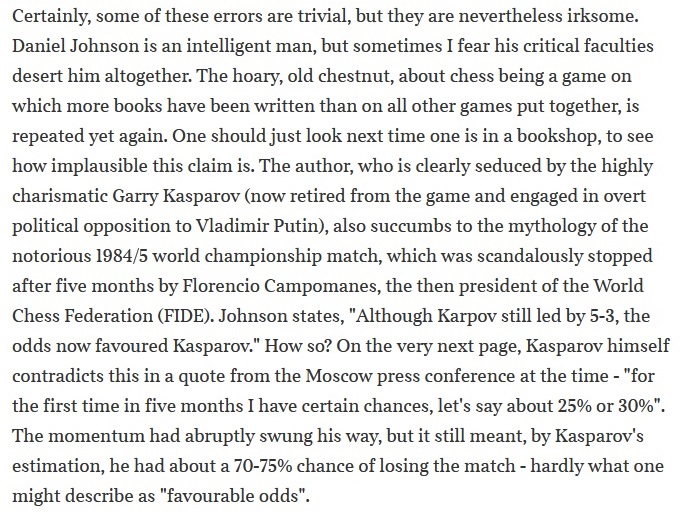
Below are the key parts of a letter to us dated 1 January 1986 from the General Secretary of FIDE, Dr Lim Kok Ann:
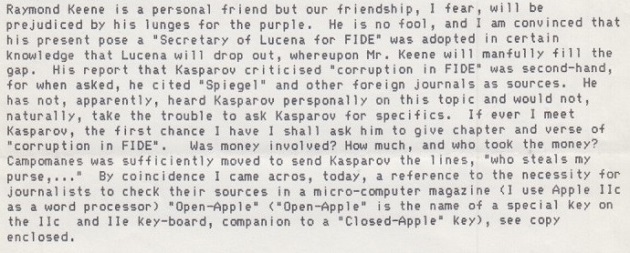


(11856)
The following comment by Yasser Seirawan at ChessBase in October 2006 is to be noted:
‘Campomanes, as we know, aborted the 1984/85 World Championship match. I make no judgment as to the rights and wrongs of that exceptionally complicated case; after all, it threw up so much contradictory evidence that the only fair-minded conclusion is agnosticism on whether or not Campomanes was correct to terminate the match.’
On page 208 of the May 1986 BCM Raymond Keene wrote regarding the ‘FIDE Controversy’:
‘I have therefore no desire at the moment to commence personal polemics, but I do feel it necessary to parry direct attacks.’
In a letter to the Editor of the BCM dated 8 May 1986 (published in part on page 257 of the June BCM and in full in C.N. 1222) we commented:
‘It is impossible to take this seriously. In the past 15 months or so Raymond Keene has used his Spectator column on countless occasions to launch violent personal attacks on Campomanes. For instance, in his five columns dated 4 January to 1 February 1986 he criticized FIDE in every single one.’
Raymond Keene repeated his untruths from the Spectator, 23 February 1985 in chapter nine of An Introduction to The Times World Chess Championship 1993 (London, 1993), although without mentioning the Spectator. For example, from page 37 of the booklet:
‘On the evening of Saturday 9 February, Campomanes was telephoned urgently from Moscow with the stunning message from the World Champion’s camp that Karpov, having lost two games in a row, was unable to continue and Campomanes should fly at once to Moscow to bail him out.’
After quoting that passage on page 16 of Florida Chess, September 1994, Lim Kok Ann wrote:
‘The impression given that Karpov had taken the initiative to get Campo back to Moscow is at variance with the official reports of Alfred Kinzel of Germany, the President’s representative in Moscow, and Chief Arbiter Svetozar Gligorić. They said that on 1 February Campo had left Kinzel in charge of negotiations he had earlier initiated with both players for stopping the match when the match score was 5-1 in Karpov’s favour. Campo had proposed that only eight more games should be played, and if no decision be reached, then a new match starting with 0:0 score should be played in September. Both players were willing to stop the match, but they disagreed on the terms. Karpov accepted Campo’s proposal to play not more than eight more games, but if no decision was reached he wanted the match to be resumed, with the current score (which had reached 5:2 as Kinzel talked to the players). Kasparov rejected the proposal to play only eight more games; he was willing for the match to be stopped forthwith and started again with 0-0 score. Kinzel felt that Campo alone could bring the matter to a conclusion and so he called Campo, with the help of Gligorić, who spoke English much better than he did. Keene should know the circumstances, but during the Kasparov-Short match the phrase “emanating from Karpov’s camp” was freely bandied about in London without correction.’
From page 42 of The World Chess Championship Botvinnik to Kasparov by R.G. Wade, R.D. Keene and A.J. Whiteley (London, 1986):
‘With speculation about the future of the match rife Campomanes received a summons to Moscow. Although this came from the chief arbiter, Gligorić, there were suggestions that it was prompted by Karpov’s camp. Kasparov (sic!) then mysteriously took a time out and Campomanes decreed that the forty-ninth game should be postponed a second time. It never took place.’
The following page stated regarding Campomanes:
‘There was no doubt that he acted constitutionally. Under the FIDE rules the buck clearly stops at the president.’
That is to be contrasted with what Raymond Keene wrote on page 8 of The Spectator, 23 February 1985:
‘... his action in calling off the match at all must border on the illegal ...’
Addition on 11 January 2008. At chessgames.com on 10 January 2008 Raymond Keene wrote the following (quoted here in full):
‘<sitzkrieg> you are in violation of the guidelines and your comments shd be taken down-however i cant resist pointing out a couple of things-
1 i have never knowingly purveyed any kind of falsehood in anything i have written
2 in the extract you quote winter seems to be unable to reconcile the facts that i sent off a telex message in the morning while elsewhere i refer to my message reaching moscow later that day-what he has forgotten -presumably because he does not get out and about much-is that moscow is three hours later in time than the uk, so it was perfectly possible to send a telex in uk morning time, while at the same time it was much later in the afternoon in moscow! that rather obviously explains why it was possible for me to know about events happening in moscow in their afternoon time while it was still morning time in london. this is so blazingly obvious i have never bothered to point it out before.
on top of that-in spite of winters desperate rearguard actions to defend the now defunct corrupt commie state- history has served its verdict on that disgraceful episode-if any umpire or arbiter in any other sport had halted the contest at the point campomanes did he wd have been lynched!’
Mr Keene mentions only one specific matter, and it is untrue. We have never overlooked the obvious existence of a three-hour time-difference between the United Kingdom and Moscow. Indeed, we drew attention to it in C.N. 1222 at the time the Keene/Tisdall telex came to light: ‘the identical text was also sent direct to Moscow, at 10:13:52 GMT (Moscow time minus three).’
On 16 January 2008, on the same chessgames.com page, a reader quoted our above factual rebuttal on the GMT question, and the same day Raymond Keene posted, inter alia, the following:
‘pls dont quote winter here on my section any more-he is very hostile to me and i dont appreciate his comments appearing here especially when he is obfuscating the issue-debating him is a complete waste of time since he is always right and never ever makes mistakes.’
This is classic Keene. We are falsely accused of having made mistakes and never admitting them – in an episode where it is Raymond Keene who has made mistakes and refused to admit them.
It is yet another example of his ineradicable mendacity. Nothing by Raymond Keene should be taken on trust, and especially about his critics, his cronies or himself.
Whether pretending to know what he does not know or not to know what he does know, Raymond Keene oscillates between bluster and silence. Although he is guileful to the gills, the guile is fortunately transparent, and he fools fewer people with every fresh aberration.
Statements by Jonathan Tisdall
On pages 263-264 of a book co-written with Jonathan Speelman, Moscow Marathon (London, 1985), Jonathan Tisdall gave a strange version of pre-Termination events, based in part on what he had been told by Raymond Keene:
‘The first concrete sign that the match was in jeopardy came to me from Ray Keene. Having returned from [sic] a diplomatic mission in Dubai concerning the next chess olympiad, Keene, Don Schultz (USA) and George Makropolous [sic] (Greece) were present when FIDE President Florencio Campomanes received a call from the Karpov camp [sic] (not the Soviet Chess Federation) saying that the champion was indeed unable to continue and that official intervention was required ...
Preliminary discussions in Dubai between Campomanes and the FIDE delegates mentioned above left the impression that a presidential decision would result in an unnecessarily favourable resolution to Karpov, unquestionably Campomanes’s preference. Keene and Schultz leaned towards declaring the combatants co-champions if play absolutely could not continue, but with no complete accord the members scattered and Campomanes went to Moscow to grasp the nettle.
General speculation filled in the silence while play was again postponed on the 13th (Campomanes time-out) and Keene called me to draft a proposal that the players be declared co-champions with a rematch of fixed duration to be held in London with the help of the London Docklands. After hurried consultation, this was done and the message telexed to Moscow.
On 15 February the storm broke and the most bizarre conclusion in chess history was fact.’
The first FIDE Facts sheet (the series of documents discussed below) commented:
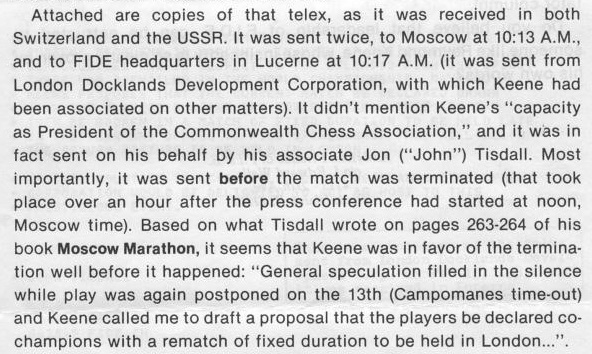
We can make no sense of Jonathan Tisdall’s contributions to a Twitter thread in February 2021:
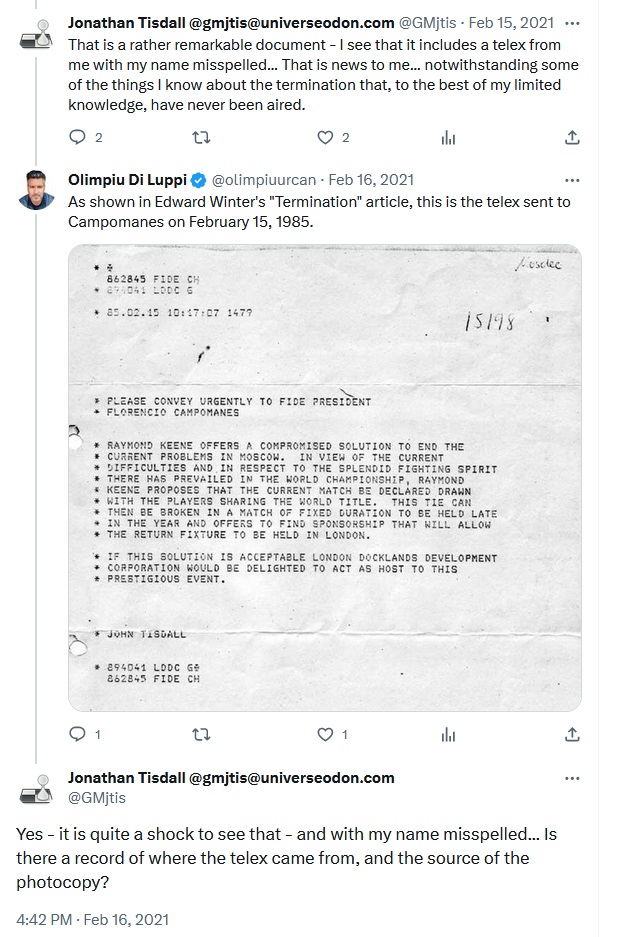
On 12 April 2024 Jonathan Tisdall specifically stated on X/Twitter, in reply to Olimpiu G. Urcan, that he had no knowledge of the 1985 telex until 2021:
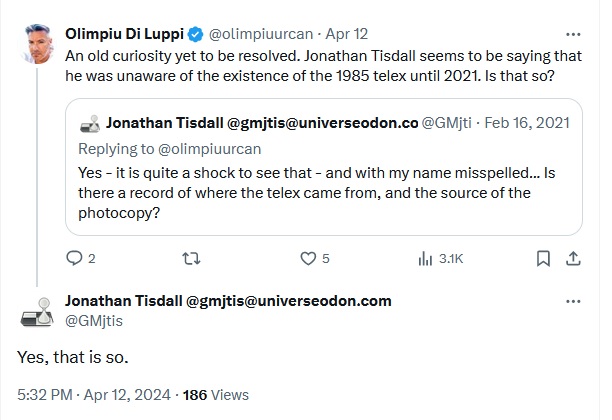
In The Times of 22 November 2008 (book section, page 18) Raymond Keene asserted:
‘The first match between Kasparov and Karpov for the world crown was stopped prematurely in early 1985 by FIDE – the World Chess Federation – acting in concert with the KGB.’
The obituary of Florencio Campomanes in The Times, 6 May 2010, page 68, contained these vague claims: ‘... at a time when the majority of the chess world’s enthusiasts were vilifying him as a KGB sympathiser ...’ and ‘... it was widely assumed the [sic] Campomanes had been acting in concert with the KGB ...’
On page 27 of the September 1985 Chess Life, Raymond Keene claimed that when the score of the 1978 world championship match stood at 5-5 he received an offer from Euwe that the contest be called off, with a rematch between Karpov and Korchnoi the following year. No corroboration of the claim has been found.
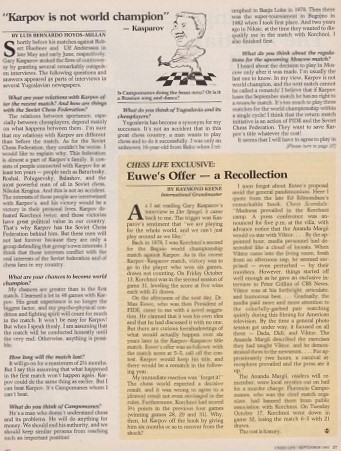
Below is a contribution by Hugh Myers (Davenport, IA, USA) published in the July-August 1985 issue of Chess Notes:
‘My attitude regarding the Karpov-Kasparov termination has been formed by what seem to be the facts of the matter, based on available documentation, and by a negative reaction to fanatical outbursts by people who clearly didn’t yet have enough information to be able to form a sensible opinion. What has been deplorable is that while it has been assumed that everything Kasparov said was true, it has been taken for granted that Karpov was not truthful when he said he wanted the match to go on.
Kasparov is praised for what is considered to be his calculated method of winning the match by wearing out Karpov physically. If someone loses a match because he can’t continue, so be it. But why should anyone want a world champion who plays dull chess and who wins on the basis of physical condition, not an ability to play brilliant chess?
In all the discussion of the controversy, hardly anybody seems to have pointed out that the statement of the West German FIDE official Alfred Kinzel makes it clear that the first request for, or even mention of, immediate termination of the match came from the Kasparov camp. The following chronological survey summarizes what I believe happened:
Late January: Campomanes decided that he wanted the match to end after a set number of additional games. This was not because Karpov seemed to be in danger of losing the match, nor was it requested by the USSR Federation. Campomanes may have used health reasons as an excuse, but it seems clear that the most important reasons were financial, plus bad publicity for chess caused by too many short and boring draws.
30 January: Kasparov won game 47, making the score 5-2.
2 February, 1.30 a.m.: Campomanes met with Karpov and Mamedov (Kasparov’s representative). Campomanes proposed eight more games (after no. 47) and if the match was not decided by then, they would restart in September at 0-0 (24-game match). Karpov accepted. Mamedov refused.
2 February, 7.00 a.m.: Campomanes left the USSR. Kinzel continued to discuss the situation with Mamedov, who said he would talk about it with Kasparov. Kasparov then contacted Kinzel, refusing Campomanes’s offer, except that he would play the September match at 0-0 only if the match were to be stopped immediately.
1-5 February: “Technical” time-out for negotiations. Kasparov protested, but he had not yet won two in a row.
6-7 February: Karpov took time-out. The BCM calls this an “illness break”. Each player was allowed six such breaks in the match. This was Karpov’s sixth regular time-out. During this time he persisted in rejecting Kasparov’s request that the match be called off.
8-9 February: Kasparov won game 48.
11 February: Campomanes returned to Moscow.
11-12 February: This is when game 49 should have been played, but Kasparov, who had apparently decided to use this time to convince Campomanes to accept his request to stop the match (or maybe to persuade him to let him withdraw that request ...), took his sixth regular time-out.
13-14 February: “Technical” time-out – for negotiations, but it is said both players made demands that haven’t been disclosed.
13 February: The USSR Federation asked Campomanes to postpone play in the match for three months. That could very well have been a pro-Karpov move, but it does not go along with the allegations that the termination of the match was a pro-Karpov move that was wanted by either Karpov or the USSR Federation. The USSR proposal was not for a new match, but for a later continuation of the same match.
The press conference. Karpov persisted, as he did later, in saying that he wanted to continue the match. Now Kasparov said so too. But after a private meeting with Campomanes, they agreed not to contest the termination, and to resume in September.
Conclusions:
1) Karpov was always willing to continue the match, with or without a set number of additional games.
2) Kasparov was willing to continue only with an unlimited number of additional games. Termination was his idea, and his preference – at least between games 47 and 48.
3) Campomanes wanted to get the match finished fairly soon. Calling it off immediately was not his idea, but Kasparov put it into his head. There is no good reason (no evidence) to believe that immediate termination was for Karpov’s benefit, nor was it requested by Karpov or the USSR Federation. It is nonsense to allege that the termination was caused by Kasparov’s winning of two games in a row. Kasparov had requested it before he won game 48. It may well be that he regretted, after winning game 48, that he had talked about termination, but Campomanes had no doubt come to like the idea, wanting to finish the match for plenty of reasons other than a very debatable benefit for Karpov.
The reports of Gligorić and Kinzel make it clear that the question of the match’s immediate termination might never have occurred if Kasparov had not originated the idea. I don’t say that Campomanes’s suggestion of eight more games after game 47 was something that Kasparov should have accepted, and it is easy to sympathize with Kasparov’s preference to start again in September at 0-0. But that suggestion, made between 1.30 a.m. and 7.00 a.m. on 2 February was only a suggestion. When Kasparov (on 4 February probably, though possibly 2 February) set the condition of immediate termination if he were to start over in September, Kasparov assumed responsibility for the eventual termination at least equally with Campomanes. (Kasparov set the condition when Campomanes was no longer in Moscow, with Kinzel, who had been delegated authority to negotiate on the FIDE President’s behalf.)
The pro-Kasparov propaganda (much of it by a group known to be pro-Kasparov and anti-Campomanes) has been shameful. Inevitably, my own analysis invites accusations of pro-Campomanes and pro-Karpov prejudice. However, in the past I have been at best neutral about Campomanes, while I have written very negatively about Karpov (the Myers Openings Bulletin, issue 21 says that his name is “stained on the pages of chess history”). I am simply pro-truth.’
(1007)
From John Nunn (London):
‘I found the piece by Myers on the world championship controversy quite interesting, although I doubt whether the full truth will ever be revealed. I attended the Campomanes press conference in London, which cleared up a few points but left a great many questions unanswered, and having now seen the outspoken Kasparov interview in Der Spiegel I have given up trying to reconcile the many conflicting statements about the events in Moscow. My own view is that it isn’t necessary to invoke any conspiracy theories; muddleheadedness, lack of communication and incompetence are enough to explain the whole bizarre story.
I would like to see FIDE shaking the world championship cycle into a more sensible form, but I doubt if anything will be done. They seem to have a tendency to keep making changes, perhaps out of recognition that the present system is unsatisfactory, but they have not clearly identified the problems, so these changes tend to make matters worse. Some players now have to play so many games in the cycle and in other FIDE events such as Olympiads that they find it hard to play in many other tournaments.’
Harry Golombek (Chalfont St Giles, England) writes:
‘Mr Myers’ intervention in the Karpov-Kasparov dispute seems a little unhappy since he merely adds a little confusion to the whole unhappy incident about which he seems to have little first-hand knowledge.’
We agree with Dr Nunn’s point about the difficulties of understanding what happened in Moscow, though this is a minority position. The anti-Campomanes/Karpov bandwagon has picked up such momentum that most journalists have abandoned any attempt at deep, even-handed investigation. Momentum invariably leads to errors of judgement, the publication of a cartoon on page 57 of the June CHESS being a particularly unfortunate example.
Apart from the fact that not too many journalists have found it easy to admit that the situation is more complex than those first agency reports intimated, there is also the point that the controversy has given latent anti-Soviet prejudice a perfect outlet. Karpov has never been widely liked, and this makes it less surprising still that writers eager for dramatic copy should, almost unquestioningly, take the side of the young challenger. Facts in Karpov’s favour have been given less publicity than tittle-tattle supporting Kasparov.
On the other hand, Karpov is blessed, or rather burdened, with the support of Aivars I. Trusis, who wrote as follows in the July 1985 APCT News Bulletin:
‘After Anatoly Karpov’s devastating defeat of challenger Garri Kasparov this past winter, one might have expected the chess world to sink into the doldrums. The windy hopes of dethroning the hated Karpov, the bête noire of the Cold Warriors, lay about like so many limp baloons [sic] after a children’s party. Malaise seemed to settle not only over the gaggle of Kasparov fans, but the chess public at large. Where was the mass audience to find its next expectation and its new excitement? Surely not in Kasparov’s forthcoming second débâcle.’
It must be hoped that one day John Nunn’s fears will be proved unfounded, and that the truth about the Moscow termination will emerge. Whether the final blame will come to rest on Karpov or Kasparov or Campomanes or anybody else is impossible to tell. There can be little doubt, however, that posterity will judge severely chess journalists’ failure to deal with the issue responsibly and to make more use of those unjournalistic words ‘I do not know’.
(1020)
The following letter from B.H. Wood (‘... with all of whose opinions we may not entirely agree!’) was sent to us at the end of August 1985 but written some time earlier (i.e. before our 23rd issue went out):
‘I consider Mr Myers’ letter one of the silliest things I’ve read. I had as good an opportunity as anybody outside the Soviet establishment to know what really happened in Moscow.
Throughout 5½ months I attended the Daily Telegraph office in Fleet Street almost daily, digesting reports from every news agency of note (these agencies live by their accuracy), also private reports from correspondents on the spot.
Crescendoing news came in, some time before any mention of postponing or stopping the play, that Karpov was gravely weakening. I was examining every move of every game and unhesitatingly described game 47 as being played by Karpov “like a tired man”. The agencies were quoting persistent rumours that he was in a state of near-collapse. There was evidence that somebody was trying to suppress these rumours.
I soon had access to tape records of the 15 February conference. I attended the press conference given later by Campomanes in London and hold a tape recording of it, every word. I have also read reports in chess magazines all over the world.
Karpov was a wreck. The Soviet authorities stopped the match to save him from defeat and they have since been making every effort, by typical half truths, distortion and falsehoods, to obscure these facts. You and Mr Myers have fallen for the skilful Soviet propaganda line but relatively few people have been fooled. I’d like to know which US figures have come round to Mr Myers’ views and who is the source of their names.
Kasparov’s “top” suggestion was in response to an offer from Karpov which he would have been indeed insane to accept and which Karpov has since confessed was put forward as a start or basis for negotiation.
Kinzel returned to Germany to face a barrage of Press criticisms of his actions. His declaration was a desperate attempt to justify his own actions. I printed it verbatim. Why should anything in it at all be “confidential”? Why the huge gaps in an otherwise detailed and painstaking (and obviously calculated) screed?
Now, the Soviets have bid to the top to secure the venue for Moscow with the same docile officials.
Myers maintains “Campomanes may have used health reasons as an excuse: but it seems clear that the most important reasons were financial”. Everybody at the 15 February conference heard Campomanes gave health reasons. The Soviet Chess Federation had summoned him 2,000 miles to do just that, but hindered him, Campomanes, from consulting the players or their doctors or the match doctors throughout four days and broadcast the decision before he made it himself. And I hold a taped record of Campomanes saying emphatically that finance played no part whatever. Lies and contradiction do abound.
My last six issues have contained many more pages of facts like these, carefully checked (though I may have printed 5-2 for 5-3). I do not seem to have seen one word quoted in your Notes. Now we see pages of hysterical, ill-informed polemic.
Does it occur to you that, for someone so prone to advise me on how to make my magazine more “even-handed”, your own presentation is far from that?’
The last paragraph is a reference to a Letter to the Editor sent by us to Mr Wood on 18 June 1985:
The statement by the FIDE official Alfred Kinzel that it was Kasparov himself who suggested termination of the late Moscow match has not been featured too prominently in CHESS. Is it true and, if so, why did Kasparov subsequently change his mind? Or is the Soviet player correct that Kinzel misconstrued his proposal?
I do think that an even-handed investigation of these crucial questions would be preferable to any more anti-Campomanes cartoons.
Mr Wood’s analysis of what happened in Moscow coincides with our own instincts when the Termination was announced in mid-February. The result was what might be regarded as our anti-Karpov remarks in C.N. 948 and 975 (should Karpov still be considered world champion?). Doubts gradually began to ferment, particularly as a result of letters received from Hugh Myers, who had persuasive arguments that, to put it at its mildest, the case against Karpov and for Kasparov was not clear-cut. It was only when it became obvious that most chess magazines were virtually 100% anti-Karpov and Campomanes (though few as crudely as CHESS) that we decided, in C.N. 1007, to publish Mr Myers’ alternative views. The description ‘hysterical, ill-informed polemic’ is nonsense and merely underlines the extremity of Mr Wood’s own position.
Whether or not Mr Wood, sitting in London, received reports from a variety of agencies is irrelevant; one thing everyone can agree on is that during the dying days of the match there were endless private machinations, news of which reached the outside world only much later. Indeed, it is still trickling out, in a variety of contradictory versions.
The line Mr Wood has taken may be the truth, but there are now so many other, no less plausible, theories that we believe the only reasonable and fair attitude is the one expressed in C.N. 1020, i.e. admitting to not knowing. Alas, Mr Wood is light years away from such a position.
See the October 1985 BCM, page 429, for Karpov’s (belated) declaration on how the match was terminated. If Mr Wood wishes to maintain the views he has expressed in CHESS, the Daily Telegraph and in the letter to us quoted above, he must take a grave step: he must categorically state that Karpov is a liar.
We are curious about Mr Wood’s suggestion that we have ‘fallen for the skilful Soviet propaganda line’. As a confirmed ‘Don’t Know’ we have not fallen for anything. Nor do we see any force in the statement that ‘Kinzel returned to Germany to face a barrage of Press criticisms of his actions’. A cynic might reply: he would, wouldn’t he, if the German press is full of Wälder.
The CHESS Editor’s view that C.N.’s presentation of the affair has not been even-handed is gratuitous and premature. He was writing solely on the basis of one item (1007) of one issue (22). But in our 23rd number we gave Harry Golombek’s negative reaction to Mr Myers’ analysis, as well as ‘statements from the fence’ by John Nunn and ourselves. Now we have given Mr Wood’s own criticisms in full, and we cannot believe it would have been possible to present fairer coverage within the modest limits of C.N.’s involvement in the Termination issue.
It must be hoped, too, that Mr Wood appreciates the fundamental difference between CHESS and C.N. It is likely that the majority of CHESS readers do not subscribe to any other magazine on the game. This most certainly does not apply to C.N., which aims to offer alternative and complementary reading. The logical conclusion is not only that CHESS has a greater responsibility not to plug one specific editorial line when there are others deserving a hearing, but also that it would not make sense for C.N. to quote, as Mr Wood would apparently have liked, extracts from CHESS (even if the coverage from Sutton Coldfield had been less biased).
We regret that a controversy with B.H. Wood should arise at this tine, since he is currently celebrating the magnificent achievement of five decades at the helm of CHESS. Warmest congratulations.
As we write, the second K-K match is well under way and the score is ‘vaguely level’. There is, perhaps, more at stake than just the world title. Whoever wins will probably receive a boost for his side of the argument over the Termination issue. Rationally speaking there should be no connection between the two things, but that’s life – and journalism ...
It would be interesting to know whether there is a journalist anywhere who is actively investigating (fairly, of course) the full story of how the first K-K match ended. Personally, we have little or no doubt that the Soviets are perfectly capable of sheltering a preferred player or nobbling his opponent. But the question is: did they?
(1061)
From Hugh Myers (Davenport, IA, USA):
‘B.H. Wood writes in C.N. 1061 that “Lies and contradiction do abound”. Yes they do, as in that very paragraph, where he said: “The Soviet Chess Federation had summoned him 2,000 miles ...” Gligorić phoned Campomanes, and the summoning was by Kinzel. There are witnesses, such as Schultz.
As regards Harry Golombek‘s comments, lack of “first-hand knowledge” hasn’t stopped most chess editors and writers from making up their minds – and those of their readers– as to what happened at the termination of the first Karpov-Kasparov match. I have read – objectively – everything I could about the situation, including reports written by the officials closest to the affair (Gligorić and Kinzel) which still haven’t been fully quoted in the English-language chess press. If what I wrote “adds a little confusion”, I think it’s better for the chess public to be a little confused than to believe what was written by a group “with first-hand knowledge” when the members of that group had a conflict of interests.’
One question that we would very much like answered: when Harry Golombek made his notorious comments about fixing during the first K-K match what ‘first-hand knowledge’ did he have? [See the section entitled ‘A major controversy in Golombek’s journalistic career’ in our feature article on him.]
With Kasparov now holder of the world championship title, chess writers may tend to drop the Termination affair, as if the full truth were known. This is obviously not so; everything is becoming more perplexing. FIDE’s presentation of its case has not been impressive, while Karpov’s handling of public relations has been awful.
We insist, however, that much of the blame for the present mess must be attributed to chess writers. The above quotes on the telephone call episode are a good indication of how chaos has ‘emanated’ from commentators. Whether this has been due to self-interest or incompetence is more than we would dare say.
It is perhaps understandable that Kasparov’s aggressive style (at the board and away from it) should make him the darling of the columnists. Tisdall, for instance, (Moscow Marathon, page 57) admits that he hoped Kasparov would win that first match, yet even he calls Schiller ‘a rabid Kasparovite’. Given that rabid Karpovites tend not to exist in the West, it is little wonder that the Termination issue has been reported in such unbalanced fashion.
(1079)
Below is a contribution sent by Hugh Myers to a Symposium on the Karpov era in Chess Life in 1986:
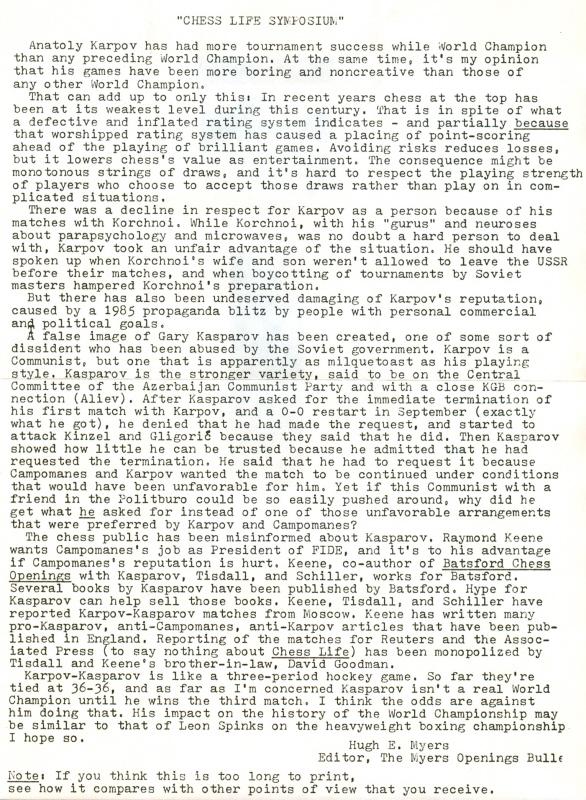
The item was published on pages 32-33 of the March 1986 Chess Life with a number of unauthorized editorial amendments.
We reproduce the first issue of FIDE Facts (July 1986), which discussed the Termination in the context of that year’s FIDE Presidential election:
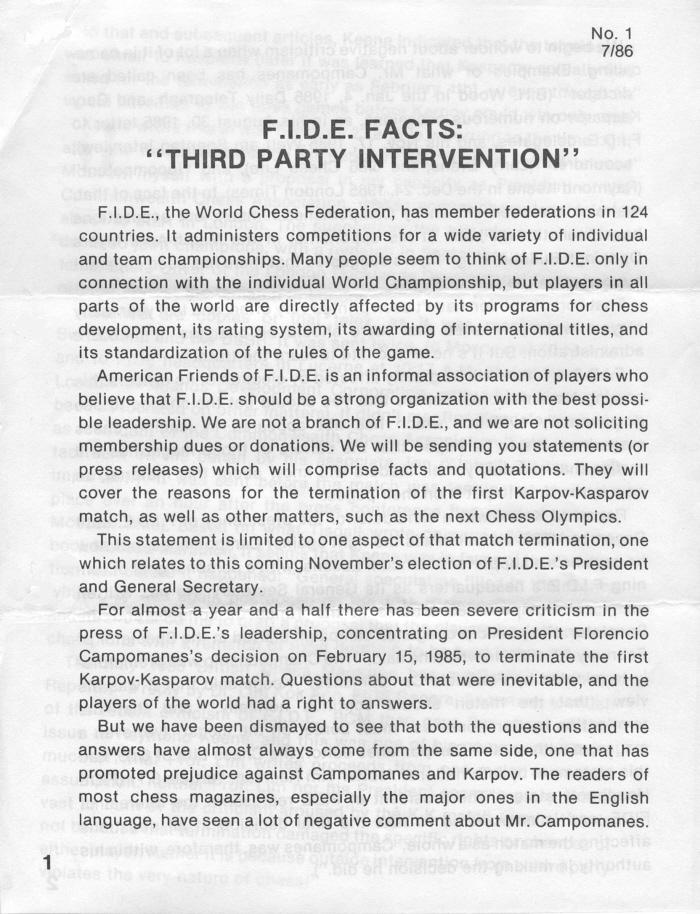
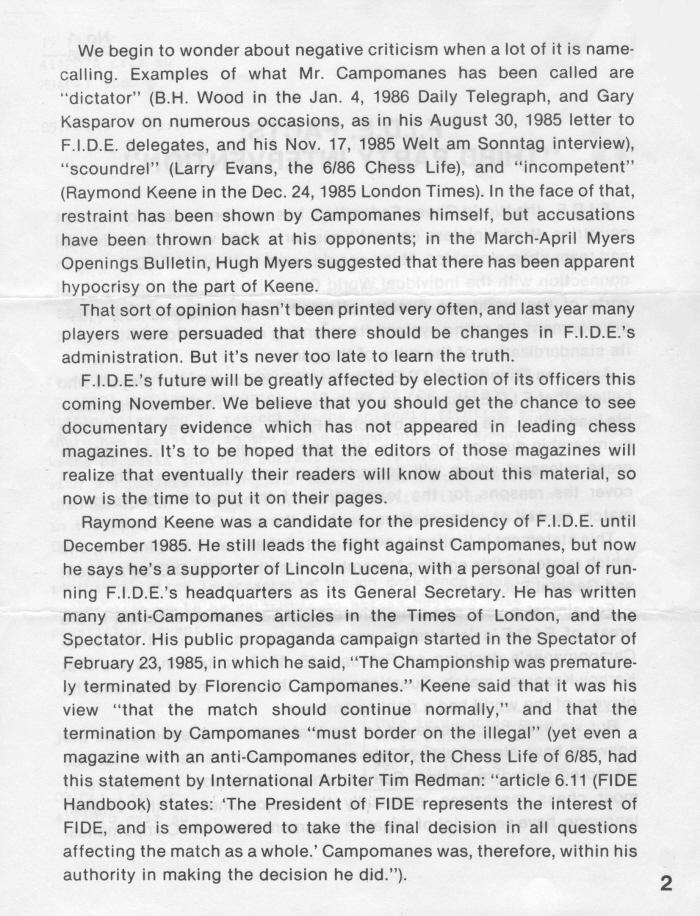
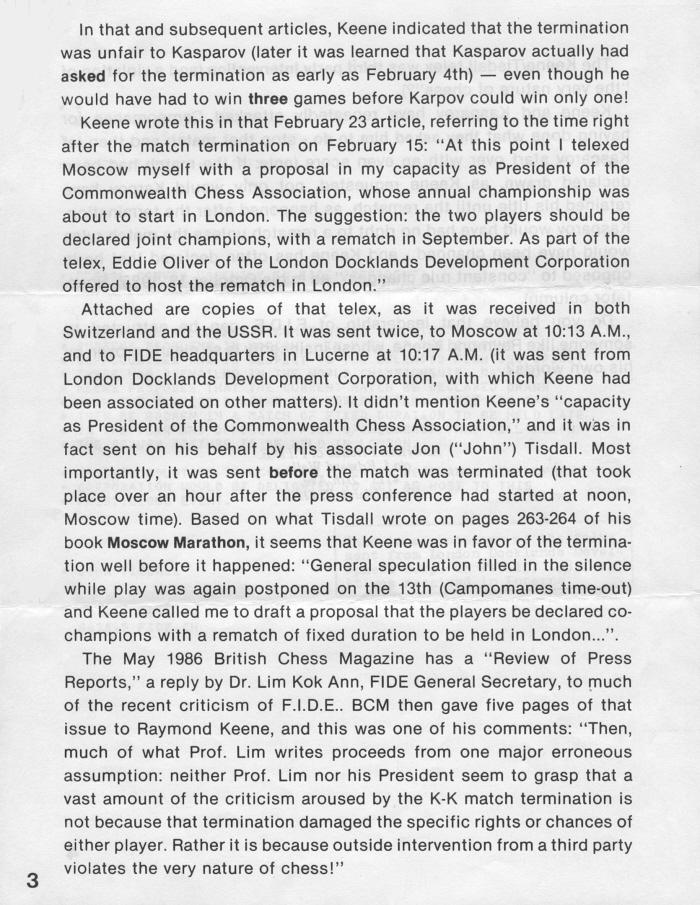
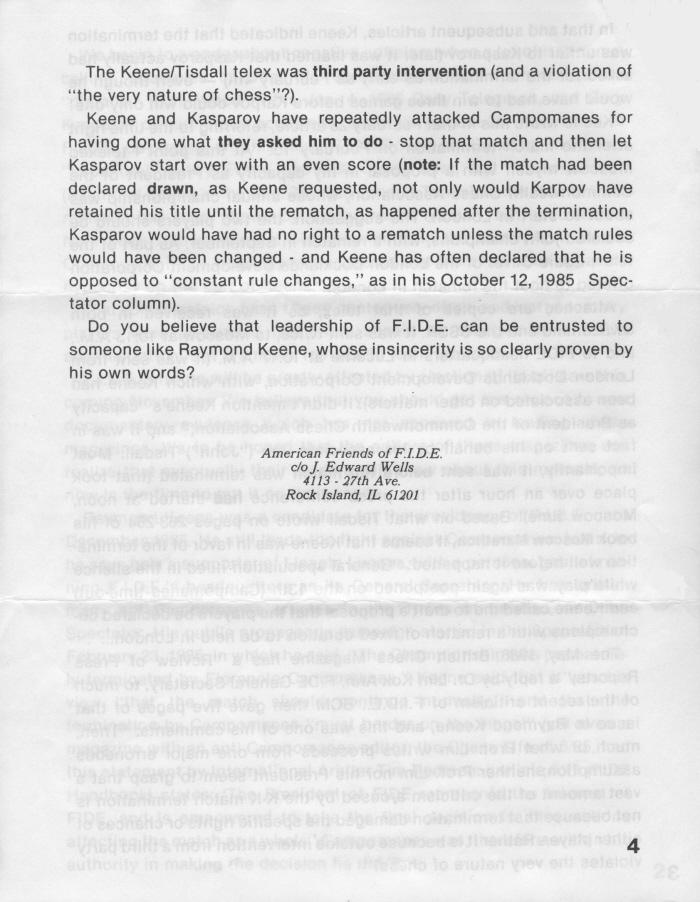
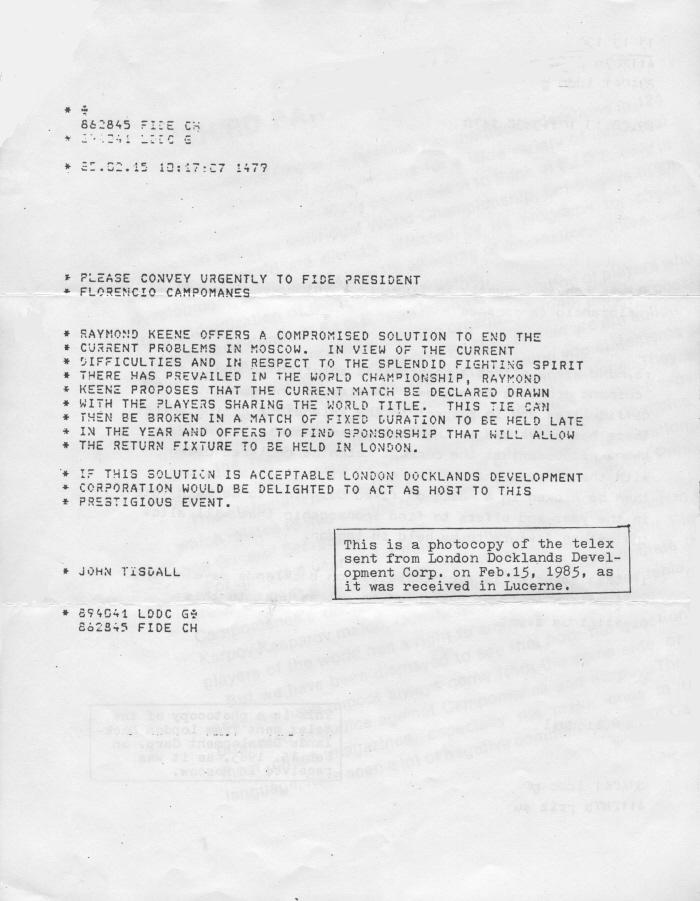
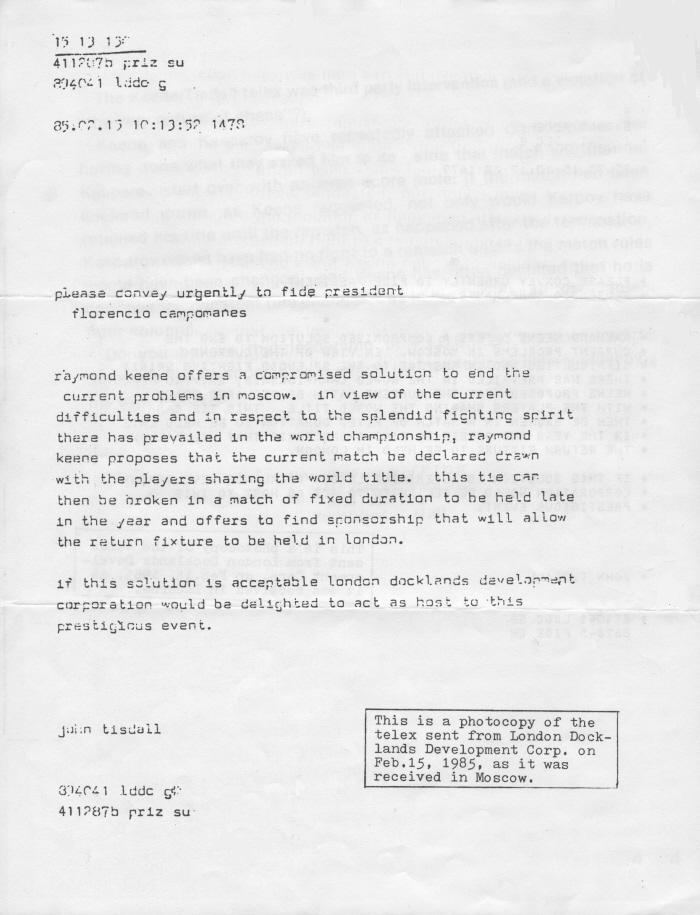
For the complete set of the ten FIDE Facts sheets, see our feature article The 1986 FIDE Presidential Election.
Illustrated with 25 “plates” with rather babyish captions, Garry Kasparov’s New World Chess Champion has annotations to all 24 games of the second K-K match. There is a regrettably, but predictably, slanted Foreword on the termination of the earlier contest. Can he really be unaware of all the new evidence which has emerged since the Anything Goes period (roughly February 1985-mid January 1986) when he and his myrmidons had the argument all their own way?
(1231)
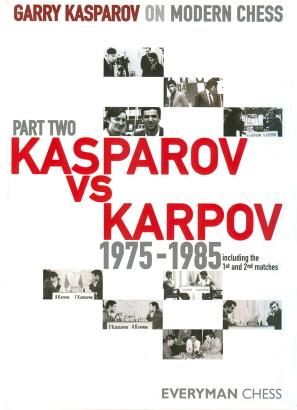
Regarding the Termination of the 1984-85 world championship match, the new book ‘Garry Kasparov on Modern Chess Part Two Kasparov vs Karpov 1975-1985 including the 1st and 2nd matches’ (London, 2008) required Kasparov to choose (irrespective of the overall conclusions he wished to present) between two approaches:
It is Option B all the way.
(5765)
Some chess chroniclers are obliged to attempt, nolens volens, to sum up in a paragraph or two the complexities and uncertainties of the Termination of the first Karpov v Kasparov match (1984-85). We wonder whether readers can quote a better summary than the one on page 84 of the revised edition of Leonard Barden’s book Play Better Chess (London, 1987):
‘... Karpov began to sit on his lead, just waiting for Kasparov to make a fatal slip. But the match was now into its fourth and fifth month, and Karpov’s strength was ebbing. Kasparov got back to 5-1, then Karpov suddenly lost two games in a row for 5-3 after 48 games. The match was becoming an embarrassment to the Soviet authorities, and play was transferred from the grand Hall of Columns to the Hotel Sport in the suburbs.
After 48 games Florencio Campomanes, President of the International Chess Federation (FIDE), took his controversial and unprecedented decision to annul the match. He made his announcement at a chaotic Moscow press conference where both Karpov and Kasparov declared they wanted to continue to play. Campomanes then led the grandmasters backstage for private discussions after which he confirmed his decision. K and K blamed each other, the chess world was aghast at what was seen as an arbitrary and false conclusion which many thought was made to rescue a tottering Karpov. Objectively, however, it was still much more likely that Karpov would win one game before Kasparov won three, and the defending champion played under a psychological burden in the next K v K series in 1985.’
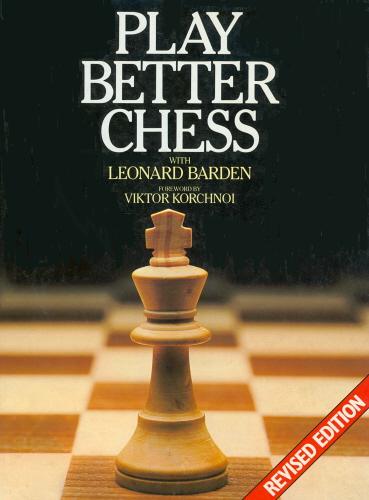
(7025)
The text of C.N. 1990, as published on page 50 of CHESS, November 1993:
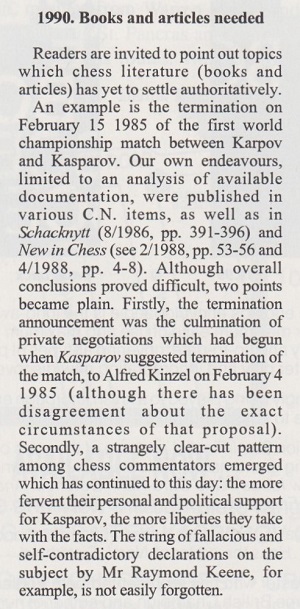
(9103)
During the shambolic press conference in Moscow on 15 February 1985 at which Florencio Campomanes announced the termination of the first Karpov v Kasparov world championship match, some sotto voce words from the FIDE President to Karpov were reportedly ‘picked up on tape’. Below is the heading on page 28 of the May 1985 Chess Life:
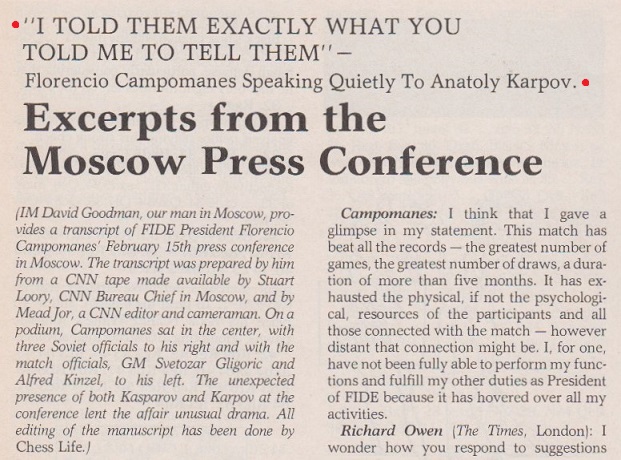
And from the following page:
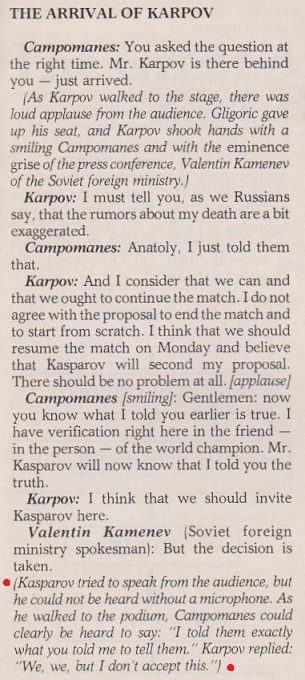
Another article by David Goodman began on page 22 of the same issue, and was introduced by an ‘Editor’s Note’ which included this:
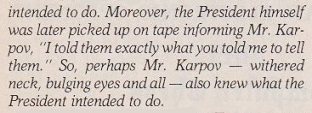
At that time, Chess Life was in the worst imaginable editorial hands (Mr Larry Parr’s). The words ‘I told them exactly what you told me to tell them’ were taken up by another anti-Campomanes magazine, i.e. on page 29 of the May 1985 CHESS:

Next, an extract from page 6 of Manoeuvres in Moscow by R. Keene and D. Goodman (London, 1985):
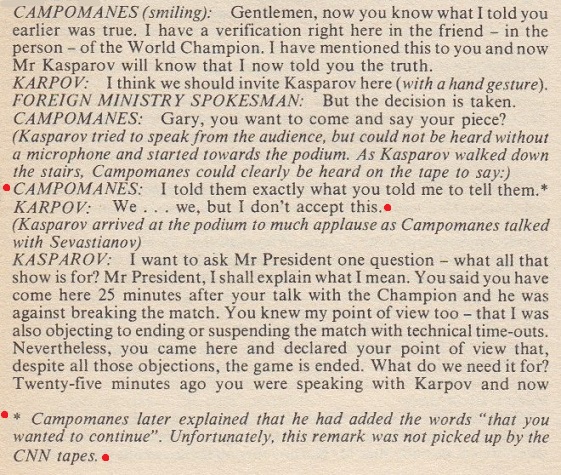
No further information was offered regarding the claim in the footnote.
From page 140 of Kasparov’s Child of Change (London, 1987), a book which included an acknowledgement to Messrs Keene and Goodman:
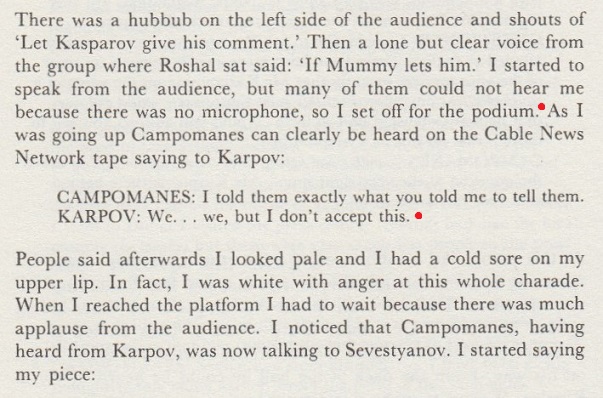
Two years later, however, there was a strange twist, on page 103 of a new autobiographical work by Kasparov, Безлимитный поединок (Moscow, 1989):
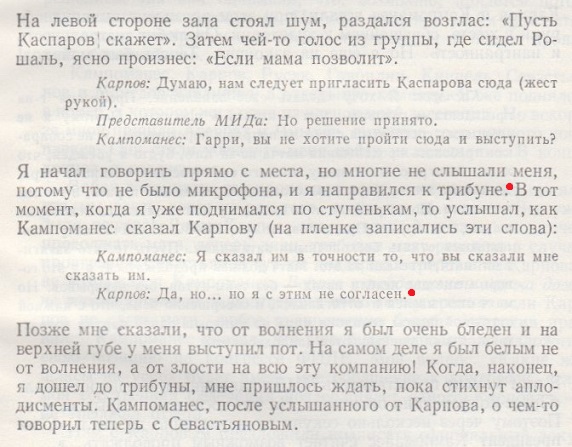
That book was a revised edition of Child of Change and was published in English as Unlimited Challenge (Glasgow, 1990). The relevant passage, from page 134:
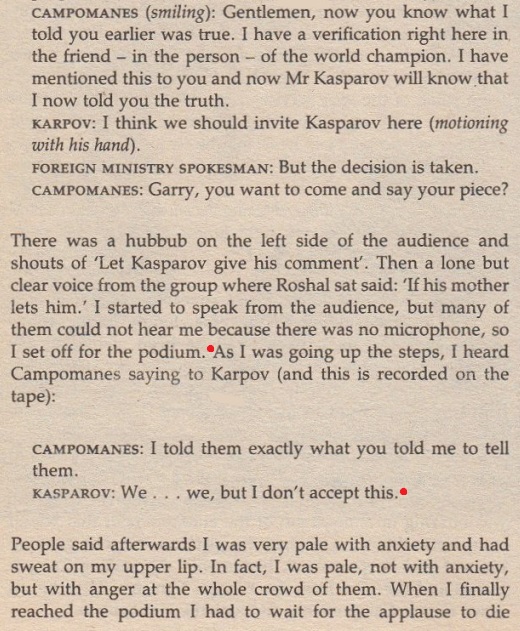
(In the final indented line, ‘Kasparov’ should, of course, read ‘Karpov’.)
So now, suddenly, there was a statement by Kasparov that he himself heard Campomanes’s remark during the press conference. ‘Campomanes can clearly be heard on the Cable News Network tape’ in Child of Change became ‘I heard Campomanes saying to Karpov (and this is recorded on the tape)’ in Unlimited Challenge. The new version was reiterated on pages 257-258 of ‘Garry Kasparov on Modern Chess Part Two Kasparov vs Karpov 1975-1985 including the 1st and 2nd matches’ (London, 2008):
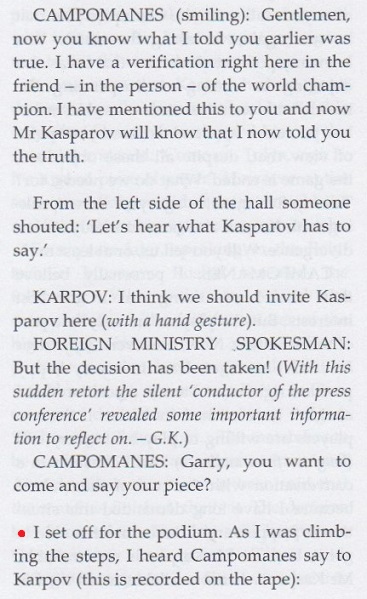
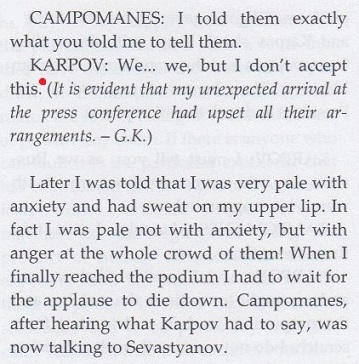
Other sources disagree about what Campomanes supposedly said and, for once, it is worth mentioning what Wikipedia states. Below is the text that currently appears in the English-language entry for Campomanes:

And in the Wikipedia entry on FIDE:
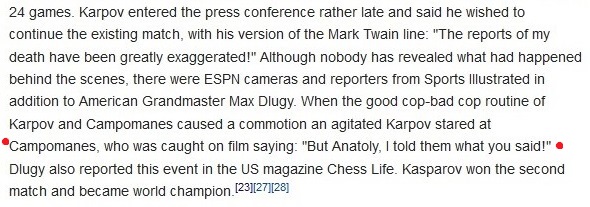
What role may have been played by Dlugy (who was aged 19 at the time of the Termination) is unclear, but in any case the words ascribed to Campomanes are completely different. Instead of ‘I told them exactly what you told me to tell them’, we now have ‘But Anatoly, I told them just what you said’ (Campomanes page) and ‘But Anatoly, I told them what you said’ (FIDE page). It remains to be discovered why such discrepancies exist.
Our final extract from the press conference transcript is on page 136 of Child of Change, showing that Karpov had indeed been saying things to Campomanes:
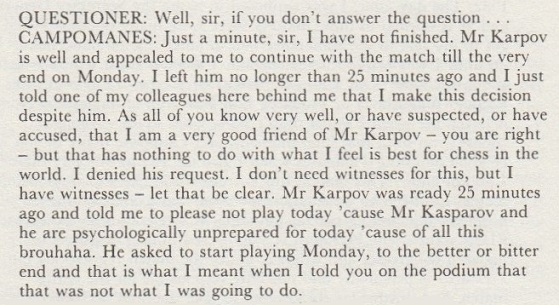
As a test, let us now put the strongest possible pro-Kasparov construction on every aspect of the episode. Let us assume, firstly, that although the hall was full and noisy, Keene and Goodman were wrong to state that Campomanes made his remark to Karpov ‘as Kasparov walked down the stairs’, and that in reality Kasparov was near enough to the podium to hear Campomanes’s quiet words for himself. Next, let us assume that an audio and/or video recording still exists on which Campomanes can be heard saying to Karpov what Kasparov says that he heard (‘I told them exactly what you told me to tell them’), and/or one of the other versions (‘But Anatoly, I told them just what you said’ and ‘But Anatoly, I told them what you said’) and/or something at least vaguely similar. Let us go further still and imagine that Karpov himself now announces that he recalls the exact remark in question being made to him by the FIDE President. How, even after all that, would we be any further forward?
For reasons of their own, writers have presented the words allegedly picked up on tape as highly significant, and as so damningly revelatory that no further explanation is needed. The very phrase ‘picked up on tape’ invites the reader to imagine that masks have slipped and that a smoking gun has been discovered. But why? In the passages shown above (not one of which comes from a trustworthy source, it should be noted) all the versions of what Campomanes supposedly said to Karpov are open to so many interpretations (positive, neutral and negative) that no responsible writer would expect, or encourage, readers to draw one particular conclusion rather than another. Regardless of the rights and wrongs of the Termination Affair – and nobody can claim to know what happened in Moscow in February 1985 – the ‘picked up on tape’ matter is the dampest of squibs.
(9580)
In the ‘Larry Evans on Chess’ column on pages 16-17 of the March 1999 Chess Life, Larry Parr claimed:
‘... FIDE halted a match with Kasparov to save an exhausted Karpov’s crown. ... FIDE president Campomanes was caught on CNN camera whispering to Karpov, “I told them exactly what you told me to tell them”’.
Evans’ reply vaguely referred to alleged views on the Termination within Kasparov’s camp (i.e. that only Timoschenko wanted the match to continue after 48 games). Evans also commented that Kasparov’s ‘outrage’ over the Termination decision ‘may have been a case of crocodile tears’.
Anyone feeling rather anti-Soviet just now and fearing for his objectivity should procure the April [1985] issue of the trilingual Schweizerische Schachzeitung and read a four-page article ‘Les énigmes de Moscou’ by Fernando Arrabal. The title turns out to be something of a misnomer since the writer has all the answers. His solution to the Moscow mess is that the most anti-Soviet masters should form a committee to arrange a championship between ‘today’s two strongest living players: Fischer and Kasparov’. Our initial impression on reading Arrabal’s grotesquely distorted account of how Fischer made it to the summit despite Soviet treachery is that here at last the West has found its answer to Kotov and Roshal. What do the Fischer experts think of Arrabal’s propaganda?
(979)
Some brief extracts from the FIDE President’s Circular Letter No. 4, 1984/05:
‘I risk unafraid because FIDE must see beyond the forest, and render decisions that long endure.’ (President’s Press Statement, 27.II.1985)
‘... the president of the Appeal Committee was Mr Román Torán ... and from October 15 that position overtook Mr Alfred Kinzel.’ (Gligorić’s report on the K-K match)
‘... Mr Campomanes appointed Mr Vitaly Sevastianov ... to act as a president of that body while waiting for another coming of Mr Román Torán from Madrid.’ (ibid)
‘Late in January, the plan matured within the FIDE-President to delimit the marathon event by an agreement.’ (Report by Alfred Kinzel)
(984)
15 February 1985 was ‘a day of shame in the history of chess’, according to page 2 of Child of Change by Garry Kasparov with Donald Trelford (London, 1987), and today, exactly 34 years after the Termination of the first Karpov v Kasparov world championship match, we have received The Longest Game by Jan Timman (Alkmaar, 2019).
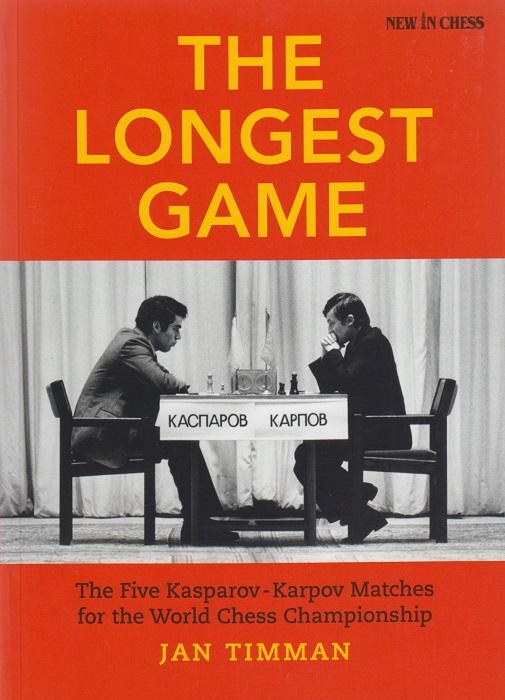
It is welcome that Timman’s account of the Termination on pages 70-77 highlights the unreliability of various claims presented to the public in 1985-87.
(11226)
On 24 May 2011 Jeremy Silman (Los Angeles, CA, USA) wrote to us:
‘As for the K vs. K match termination, let me say this: Anyone that’s down 3 to 5 and gets the chance to have the match cancelled (and play a new one from scratch with a 0 to 0 score) should be more than delighted. In chess, like in all other things that call upon any form of politics or ego, 99.9% of the unavoidable rhetoric should be completely ignored.’
Regarding the speculative claim by Harry Golombek in The Times in October 1984 that ‘perhaps Kasparov has been warned not to play well and has been given to understand that the consequences for him and his family would be disastrous if he did’, see Harry Golombek (1911-95).
There follows an interview by Giam Choo Kwee with Lim Kok Ann which the latter sent us in September 1986:
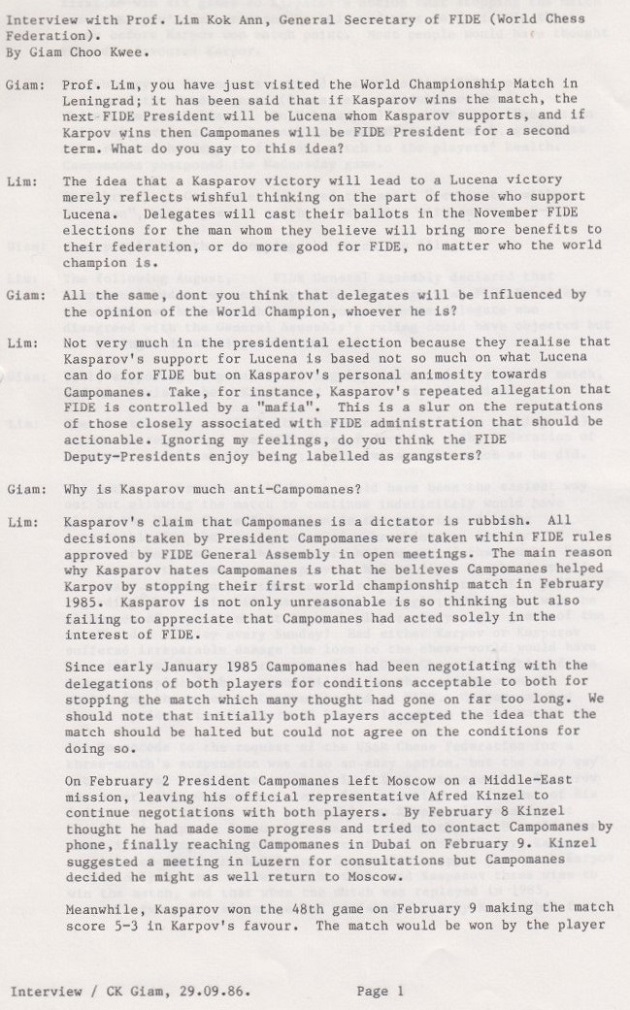
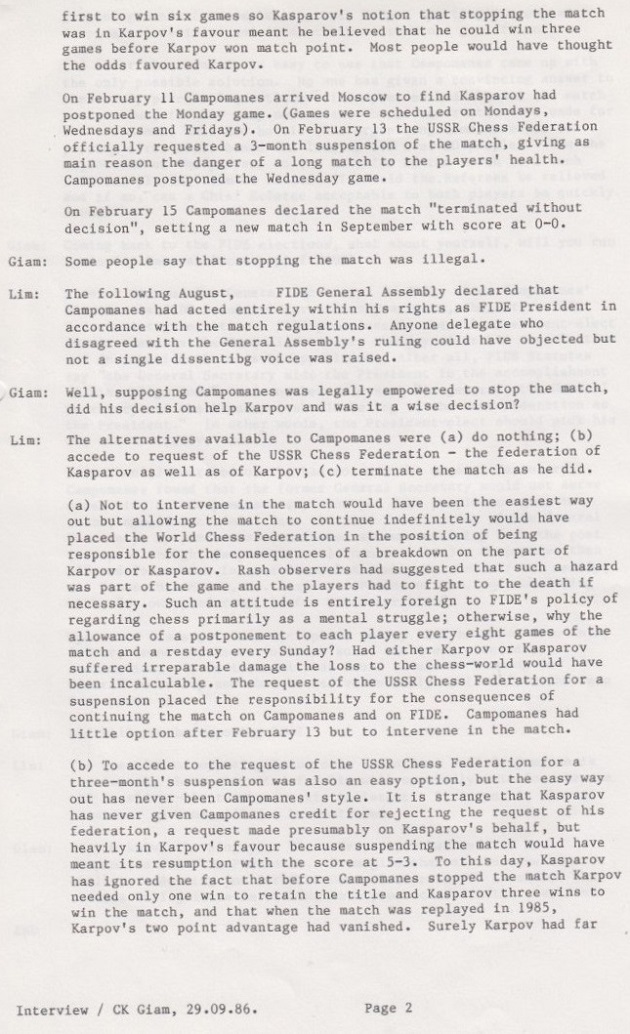
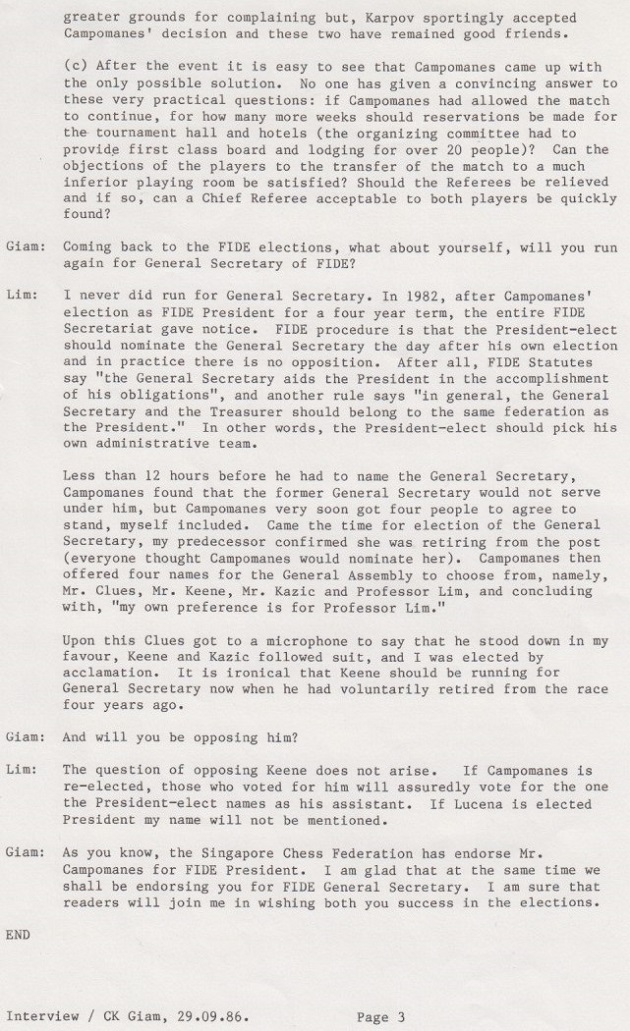
This 1968 photograph of Giam Choo Kwee and Lim Kok Ann comes from the private archives of Choong Liong On and is reproduced courtesy of Olimpiu G. Urcan (Singapore):
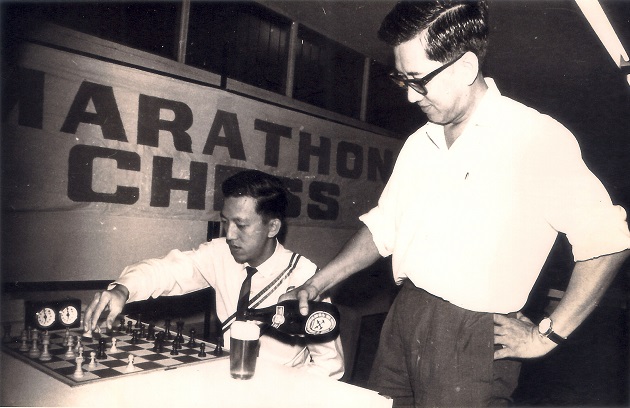
Regarding the picture, see too page 99 of the book Singapore Chess (C.N. 10567).
(11817)
Concerning the role of Gligorić in the Termination, which are the best sources of information published in the Yugoslav press of the time?
Our archives contain (received from a third party many years later) a broad overview by Dragoslav Andrić which may serve as a basis, although it requires factual and linguistic verification throughout:
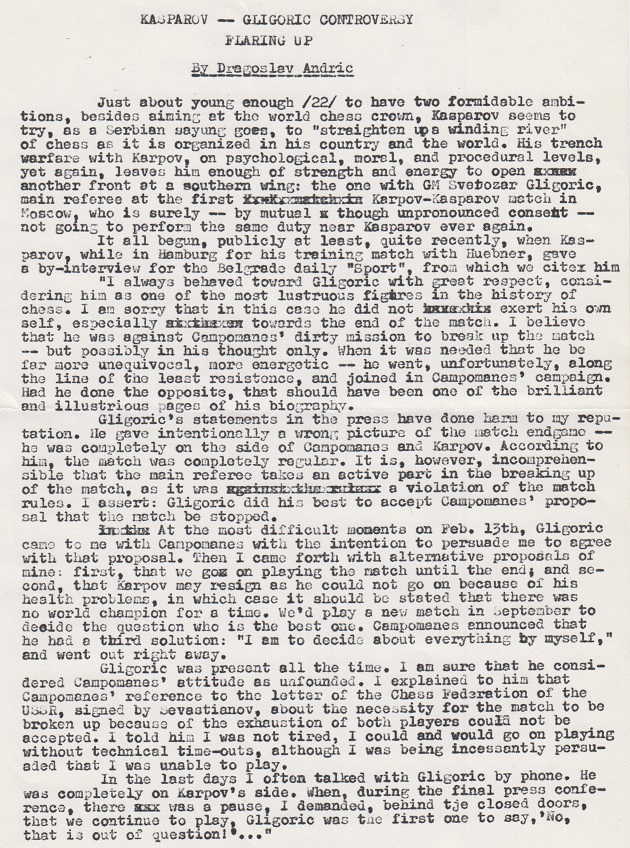
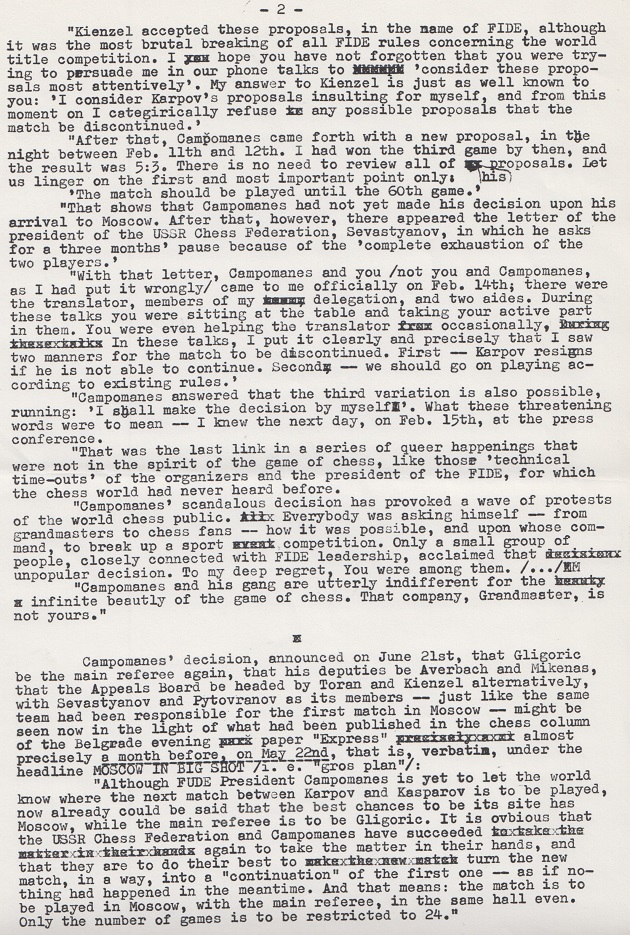
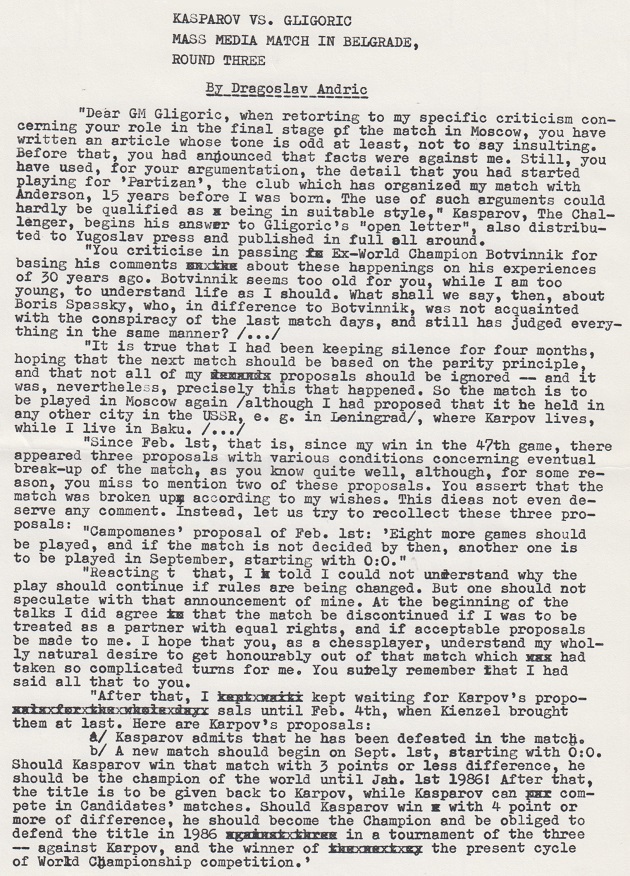
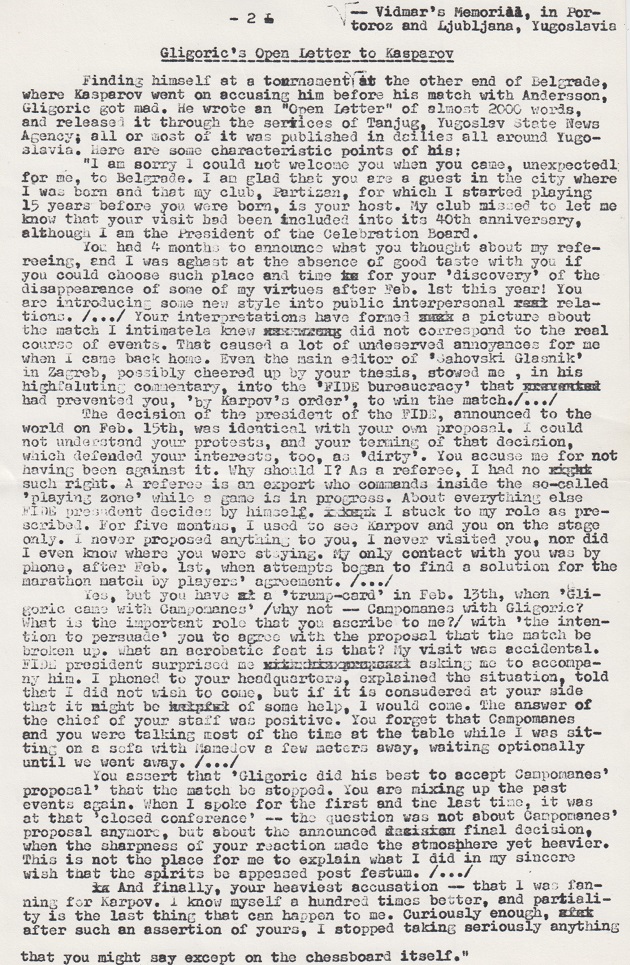
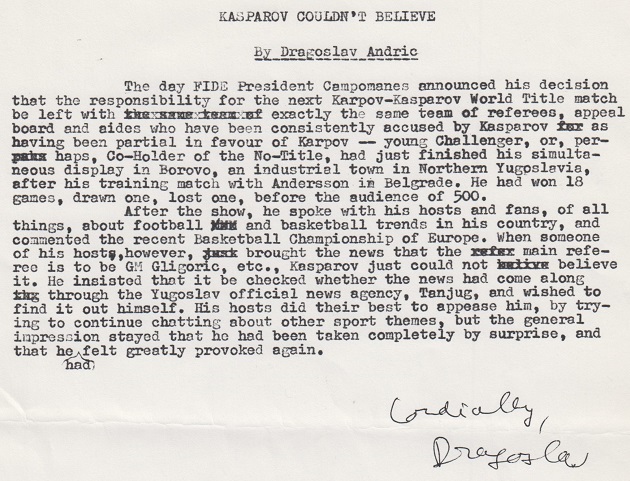
Annexe 11 to the FIDE President’s Circular Letter No. 4 1984/85 comprised a seven-page report by Gligorić on the first Karpov v Kasparov match. The Termination was discussed only briefly on the final two pages, the reader being referred to Annex B (a presentation of the final phase by Alfred Kinzel).
Documentary material based on fact, whatever the writer’s stance may be, is welcome in this section.
***
Below is the FIDE President’s Circular Letter No. 3 1985/86, dated 25 February 1986. It includes an extensive ‘Review of Press Reports’ by Lim Kok Ann, the Federation’s General Secretary:
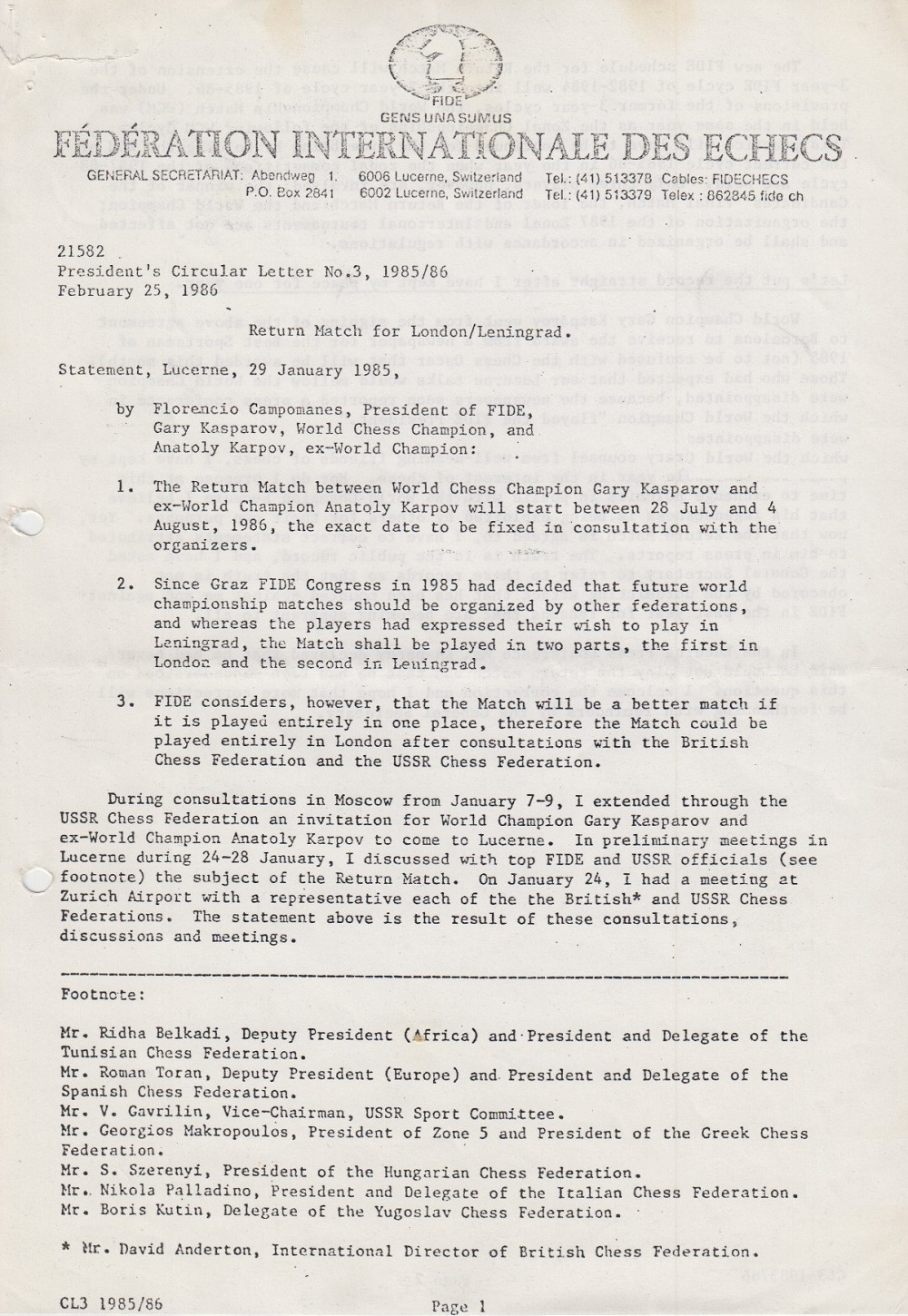
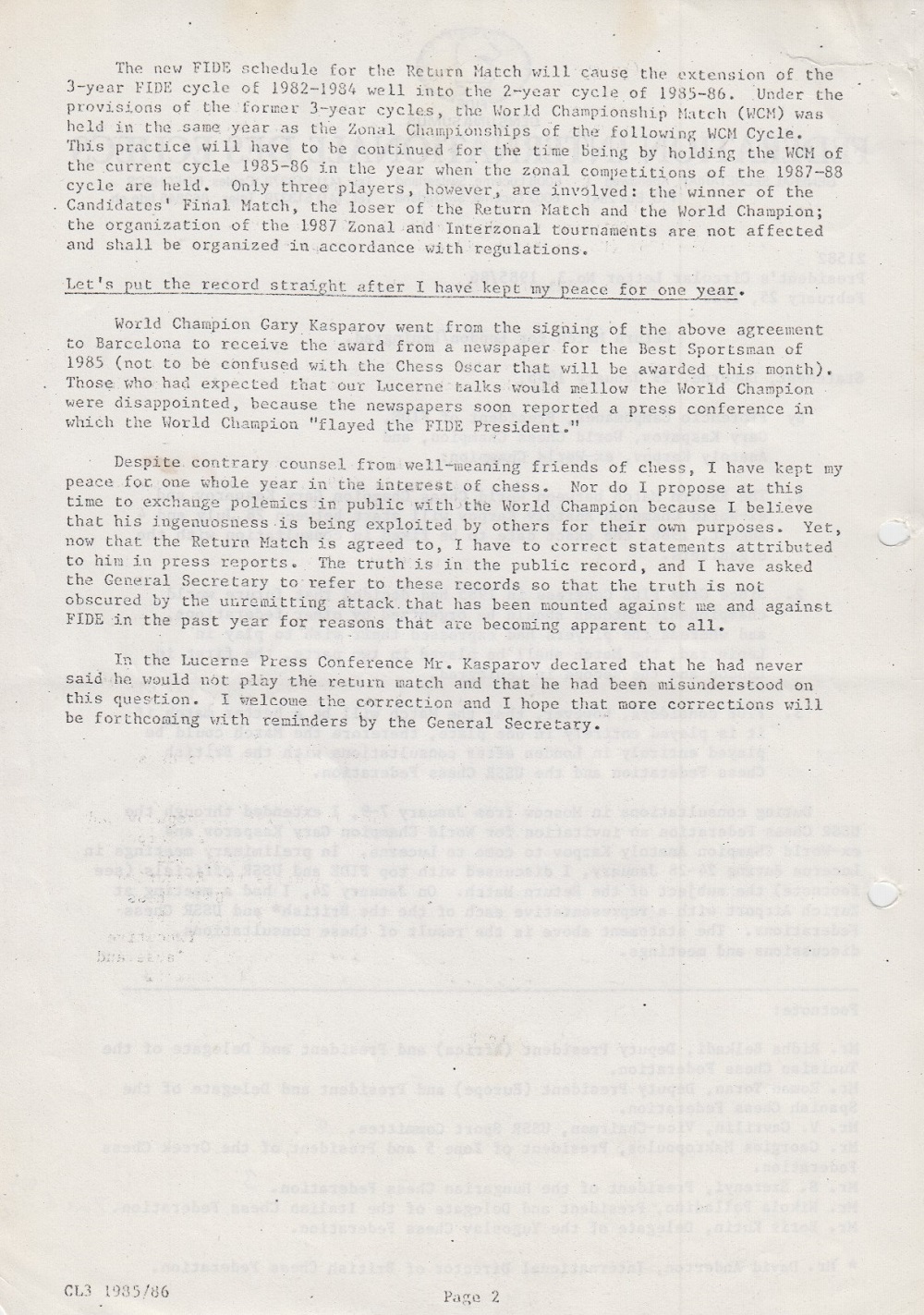
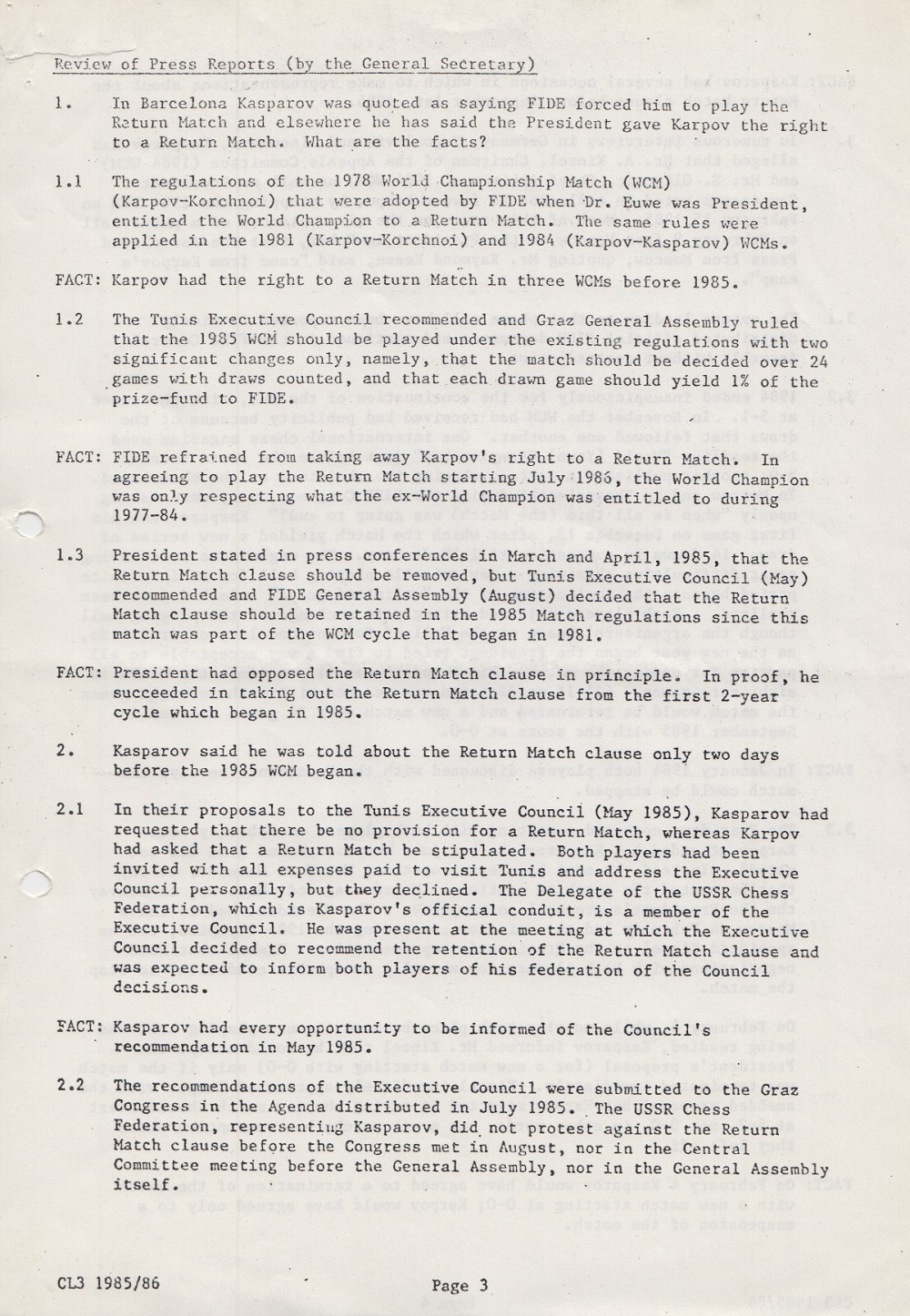
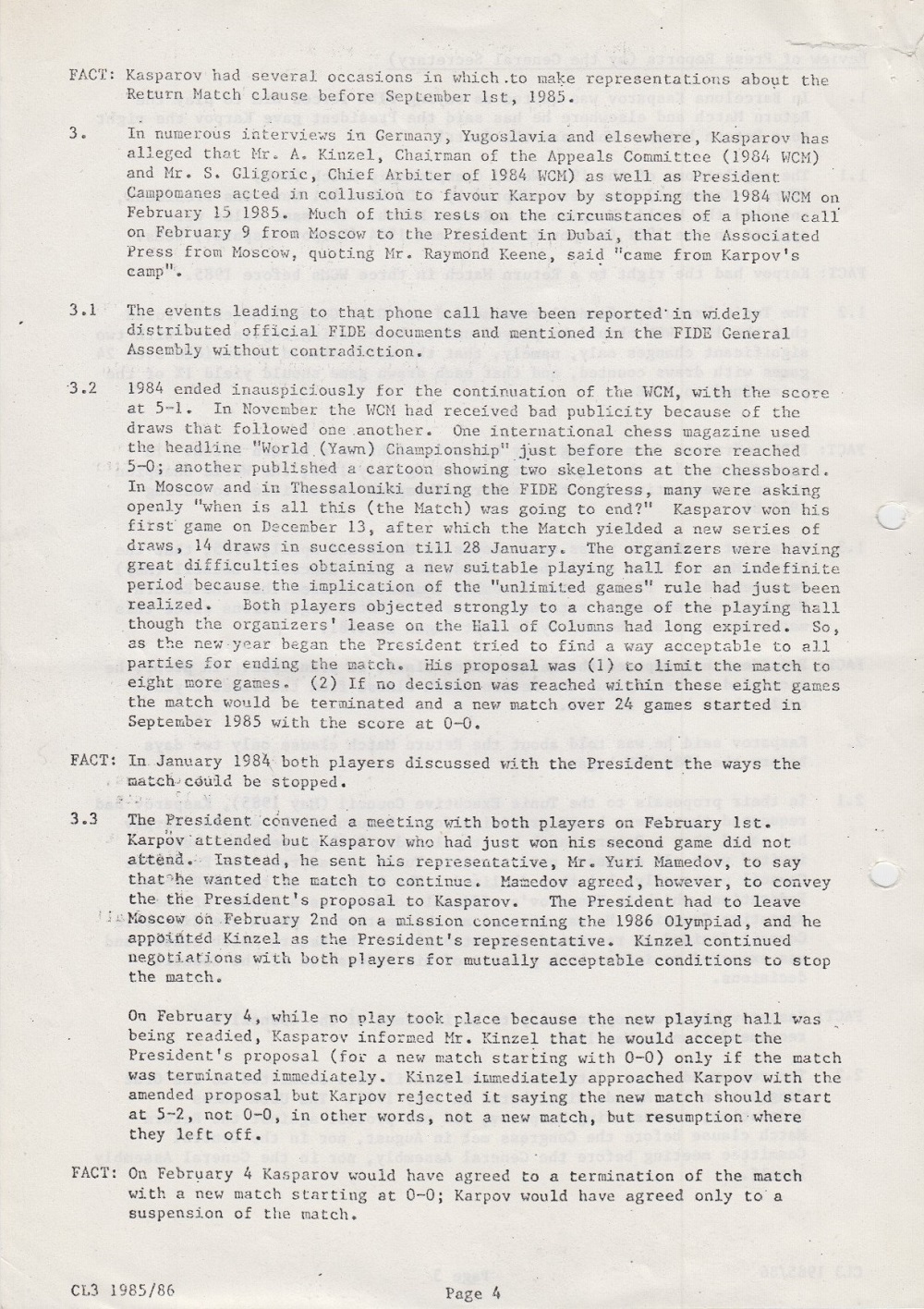
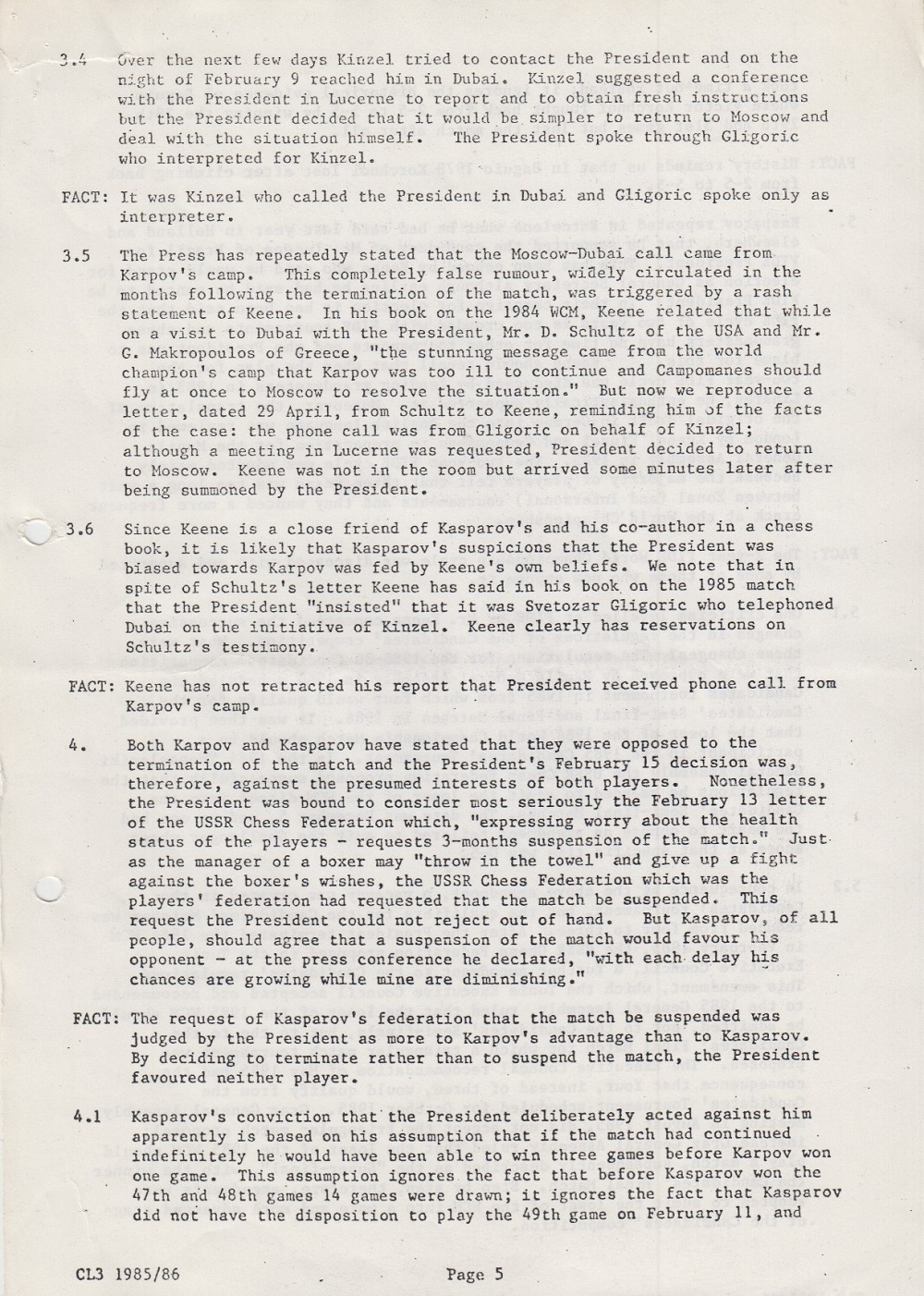
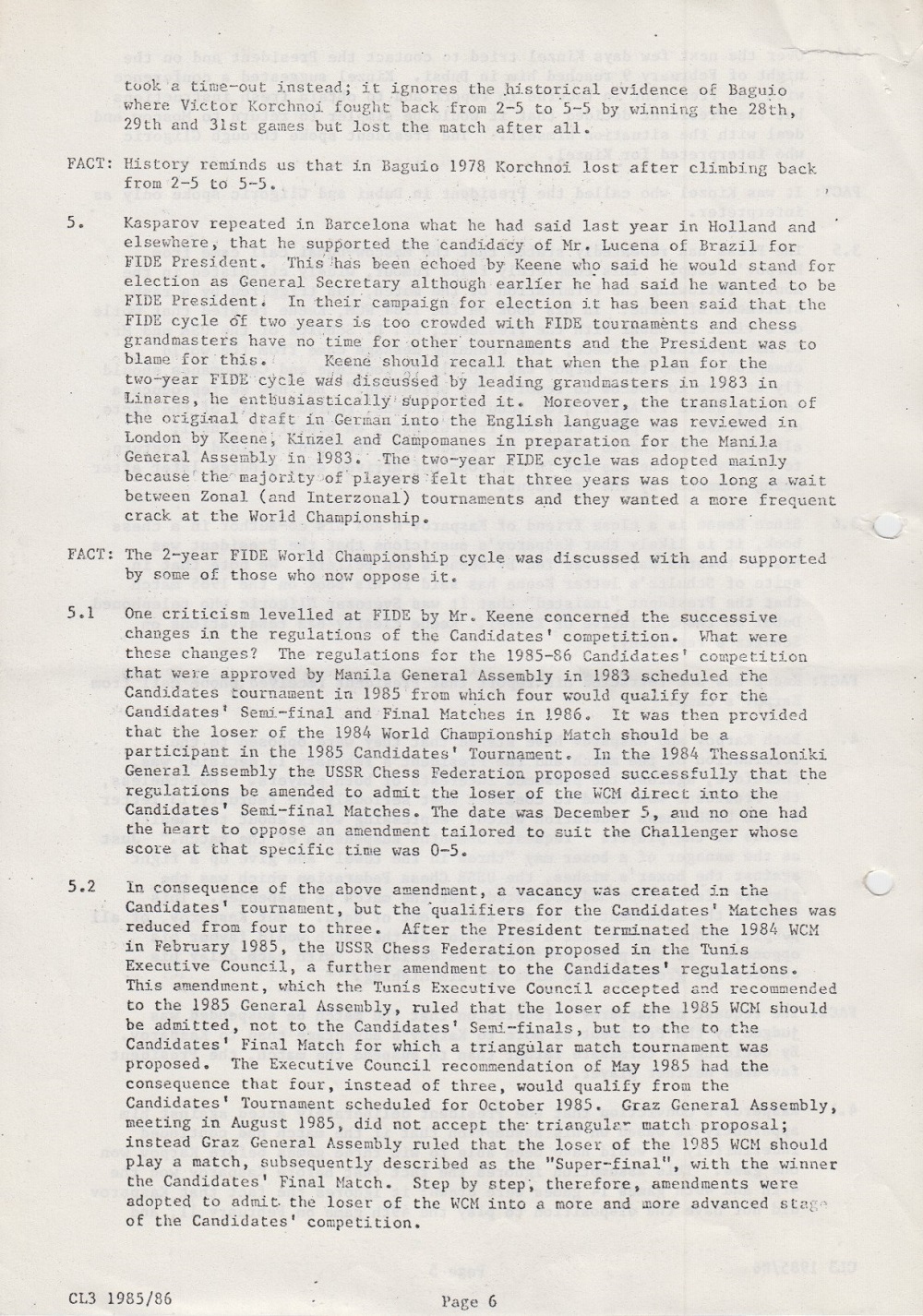
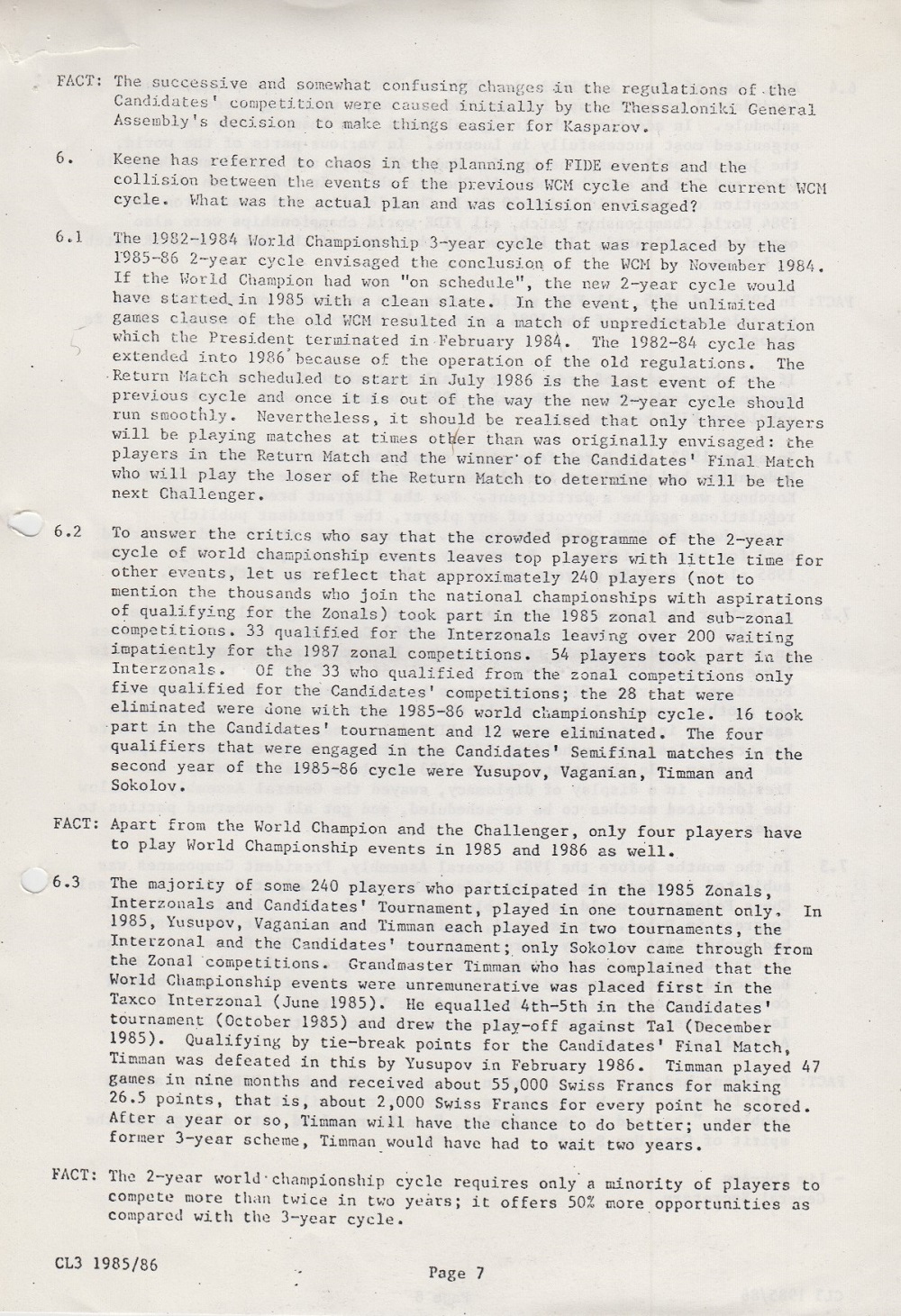
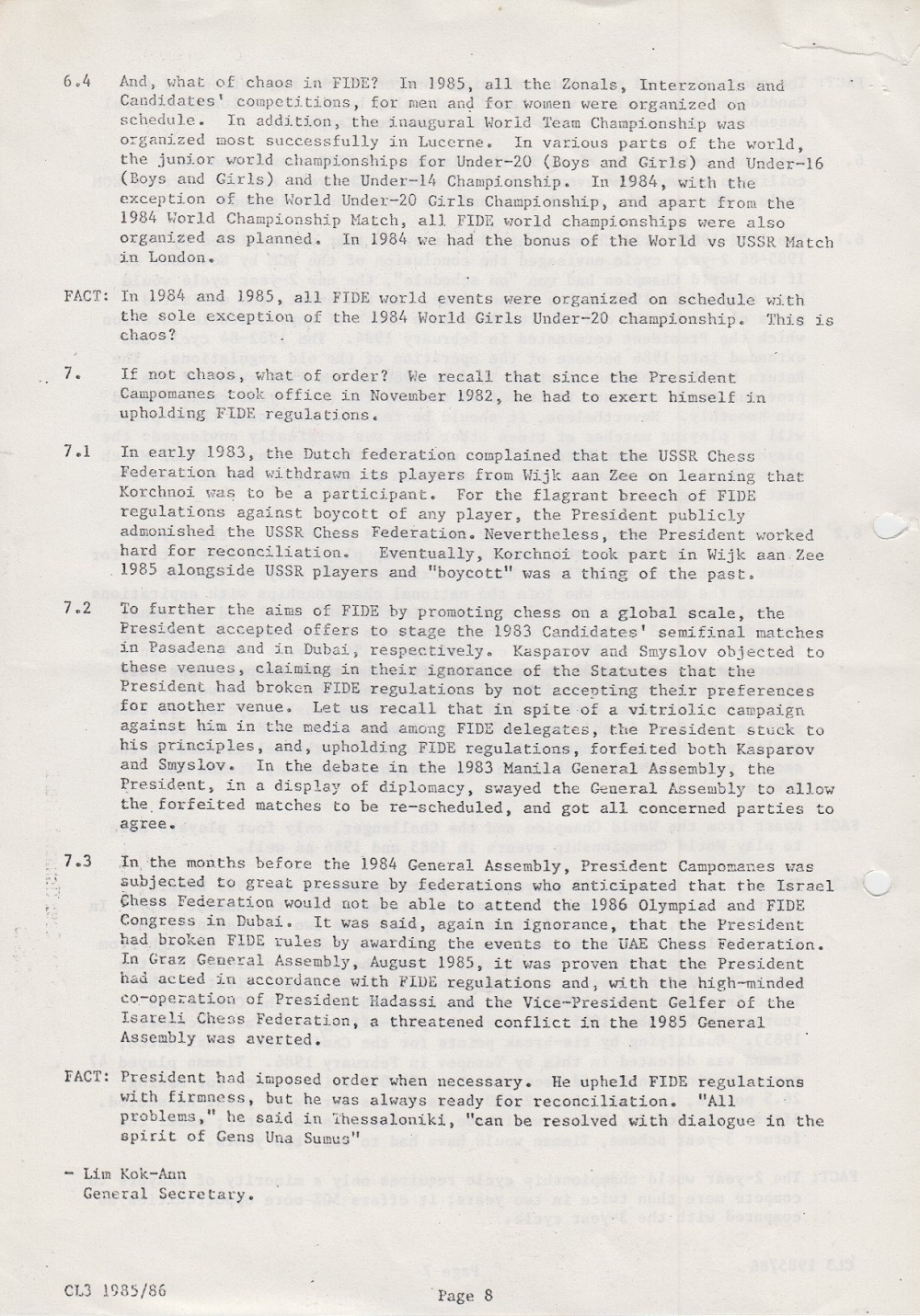
FIDE Facts sheet one above mentioned that Lim Kok Ann’s text was published in the May 1986 BCM, followed by a response from Raymond Keene (pages 188-195 and 204-208 respectively).
The text below appeared on pages 1-2 of the FIDE President’s Circular Letter No. 4 1985/86, dated 28 April 1986:

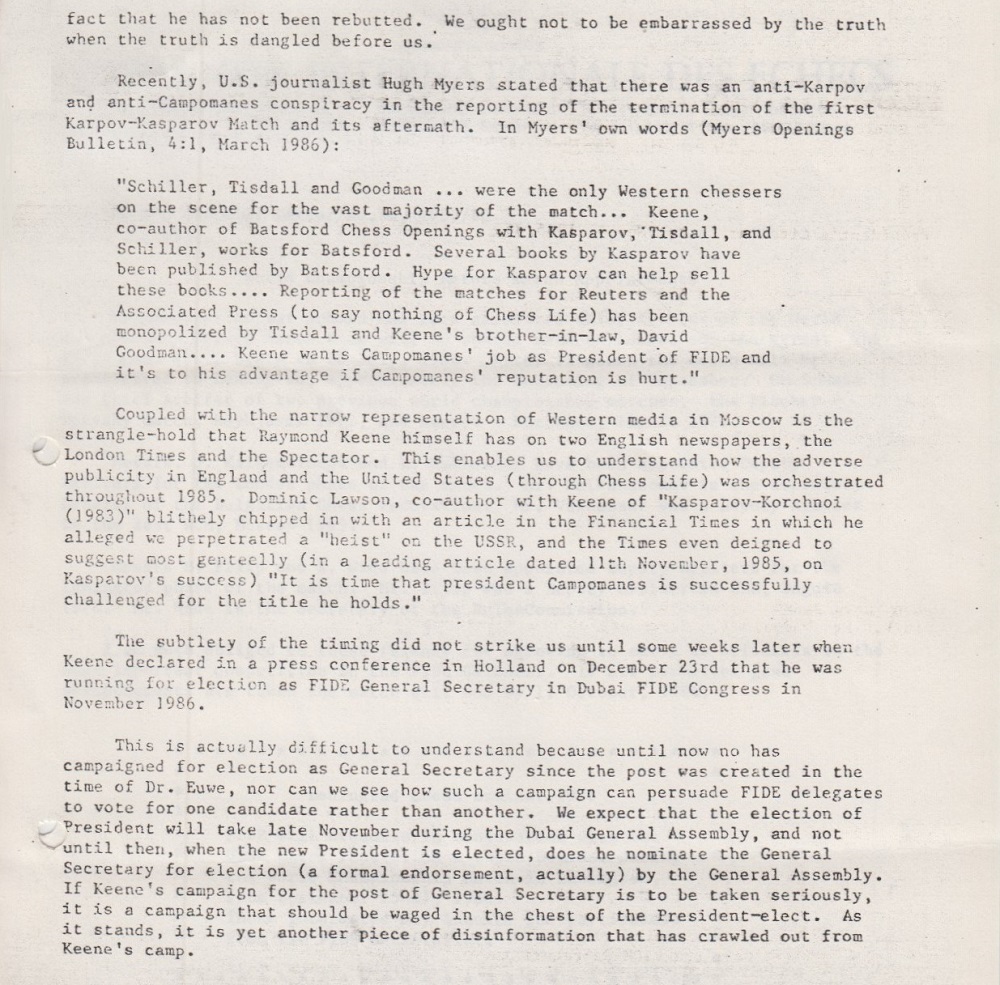
Concerning the Commonwealth Women’s Chess Association (see FIDE Facts sheet six), below is a sample from its documentation:
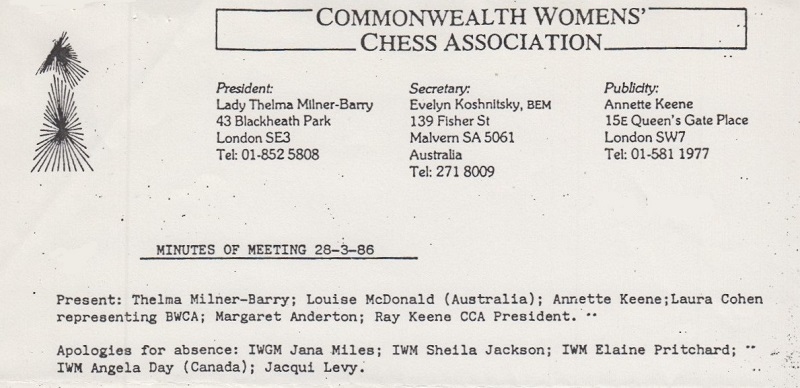
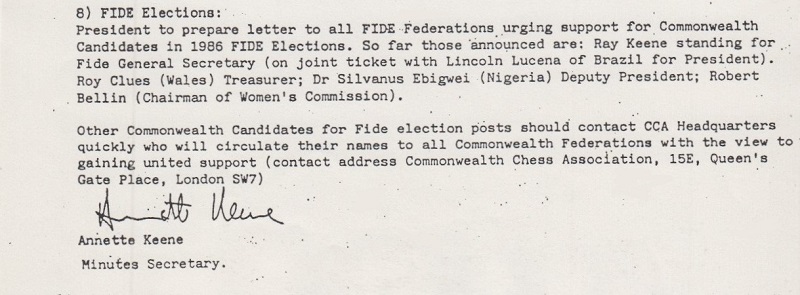
The letterhead even blunders in the title of the Association, but that was not the fault of the supposed Secretary. On 20 June 1986 Evelyn Koshnitsky informed the FIDE Headquarters in Lucerne:

David Spanier’s Total Chess has recently appeared as an Abacus paperback ... It has some brief new material: Spanier writes an offensively ill-informed account of the Termination episode. It would have been better simply to make corrections to such matters as Petrosian and Kasparov’s years of birth (pages 152-153).
(1232)
See also Rebuttals, which focuses on how Keene-related matters were handled by the BCM when the Editor was Mr Bernard Cafferty.
A fine article is ‘Ex Acton ad Astra’ on pages 18-33 of the Spring 2007 issue of Kingpin.
As shown in Cuttings, the BCM had a fleeting epiphany over Raymond Keene in 1993:

Source: BCM, May 1993, page 231.
C.N. 10841 showed these excerpts from pages 228 and 232 of the same issue, in an article by Murray Chandler and Bernard Cafferty:



Our Preface to Chess Explorations (1996) commented that Chess Notes was ‘born from the stark realization that the beaten track of chess literature was bestrewn with fallacies, guesswork and hearsay’ and that C.N. attempted ‘to clear away some of the deadwood and supplant it with a garland of more reliable material, founded on proper documentation’. With the Termination, much deadwood has been cleared away, but the supplanting process is slow and difficult.
To set the public record straight, a methodical approach can help: rebut misinformation and speculation, staunch their propagation, piece together the truth. First destroy, next blockade, lastly rebuild.
On 3 May 2010, the day Florencio Campomanes died, Eric Schiller posted the following message at chessgames.com:
‘An evil man who is not going to be missed. Thoroughly corrupt persecutor of those who wanted chess to move forward. Destroyer of our beloved World Championship.
Some champagne with dinner tonight to wish him good riddance!’
From another chessgames.com page later the same day:

A Times tweet posted by Raymond Keene on 16 January 2013:

To the Chess Notes main page.
To the Archives for other feature articles.
Copyright: Edward Winter. All rights reserved.